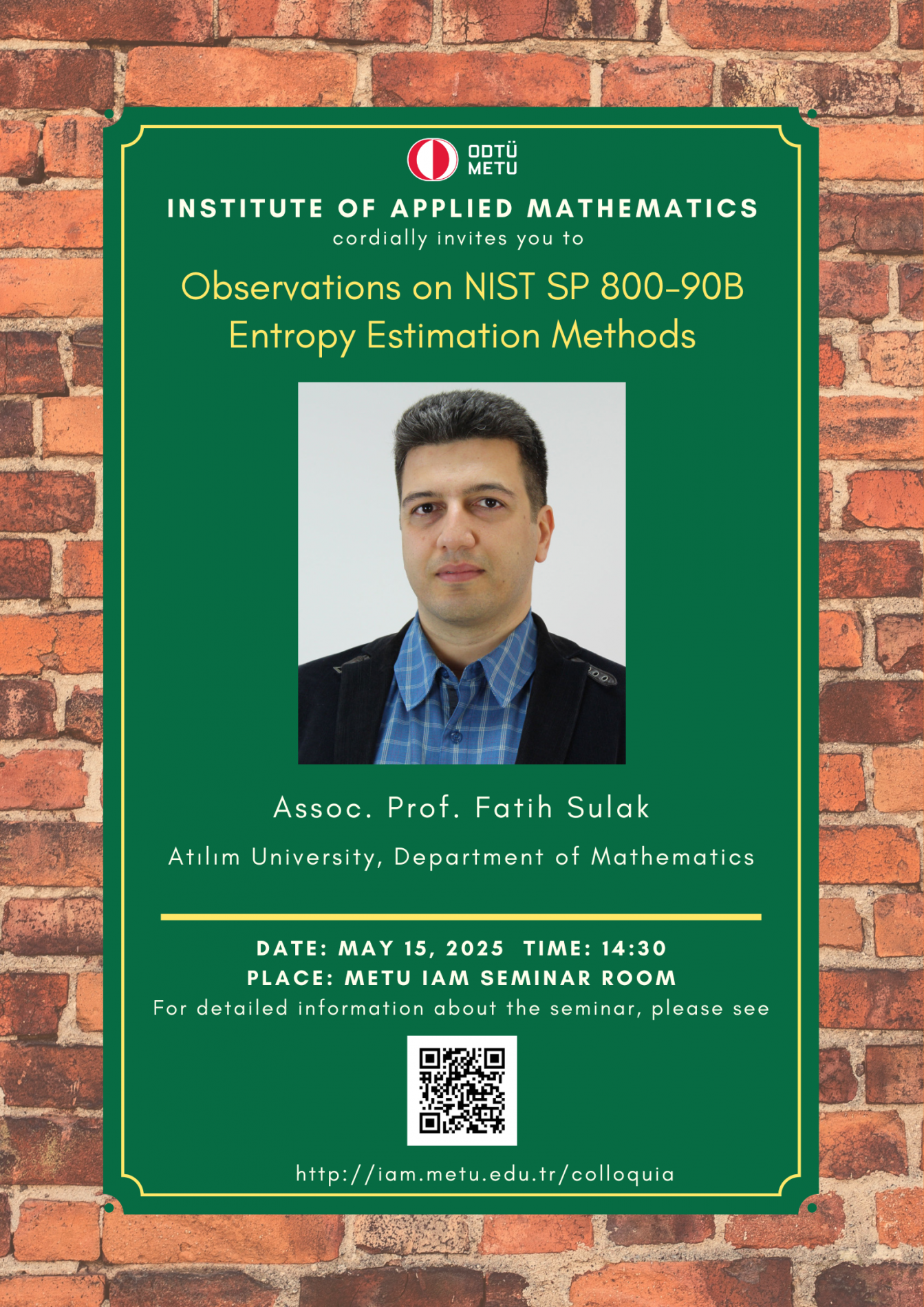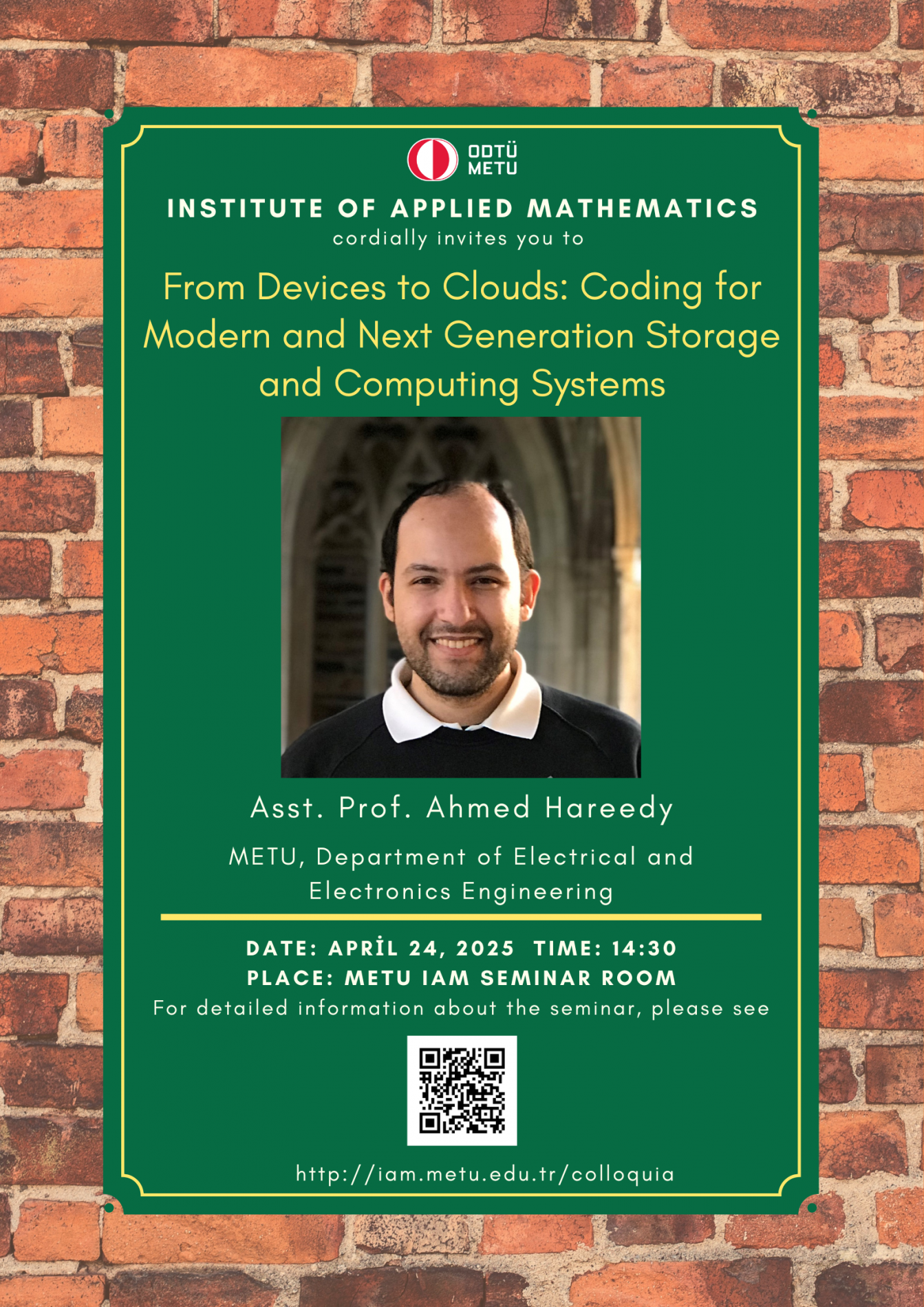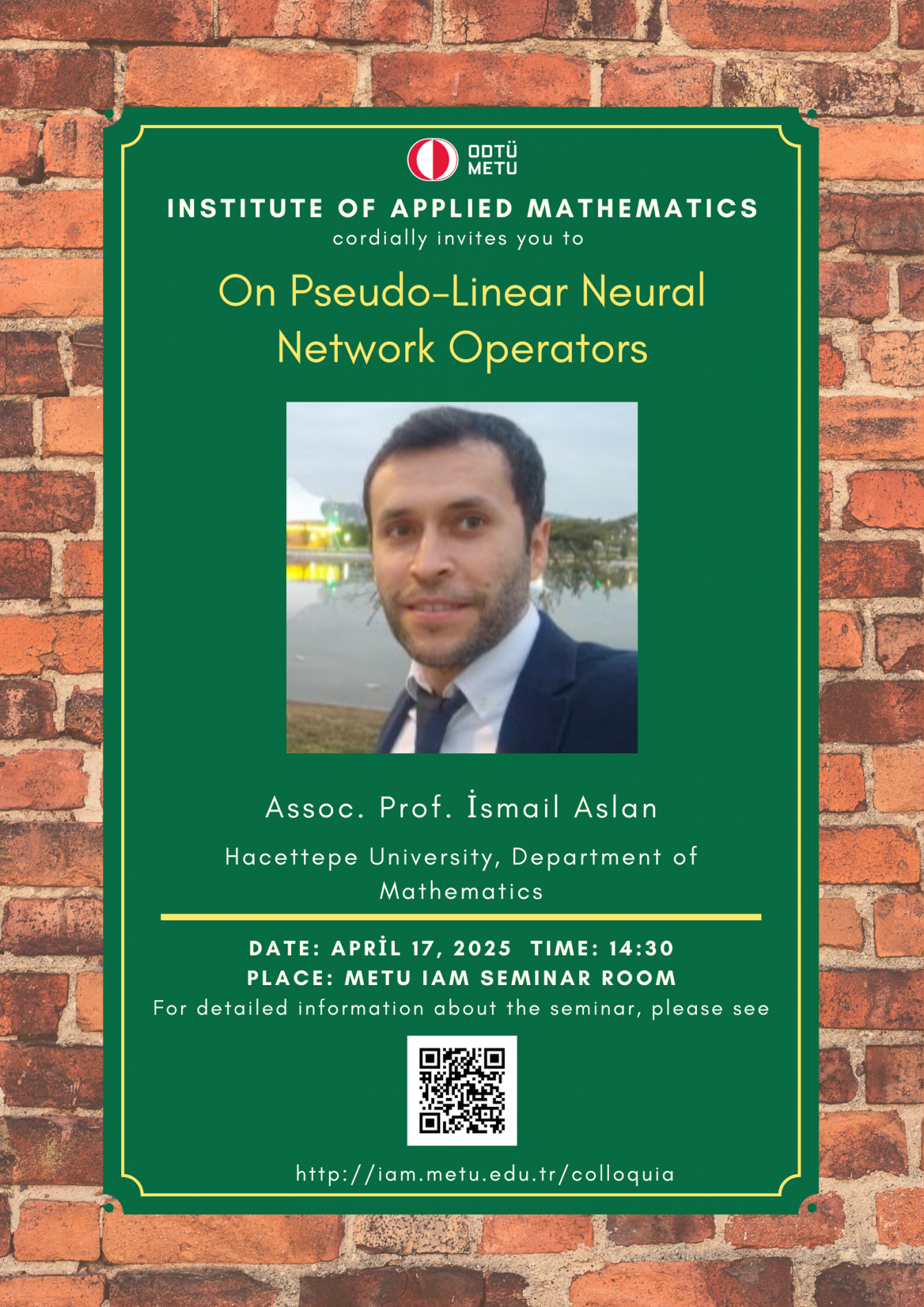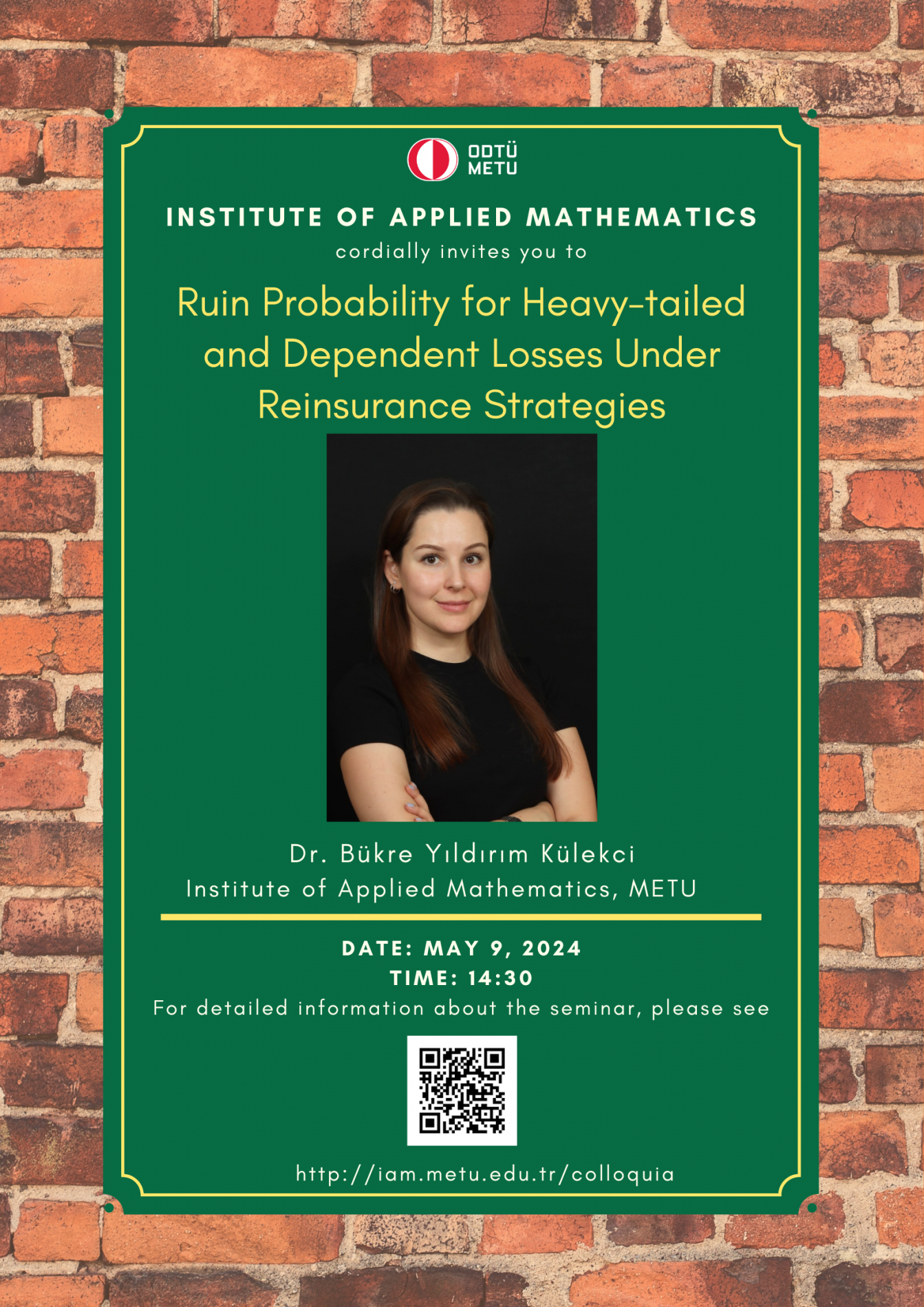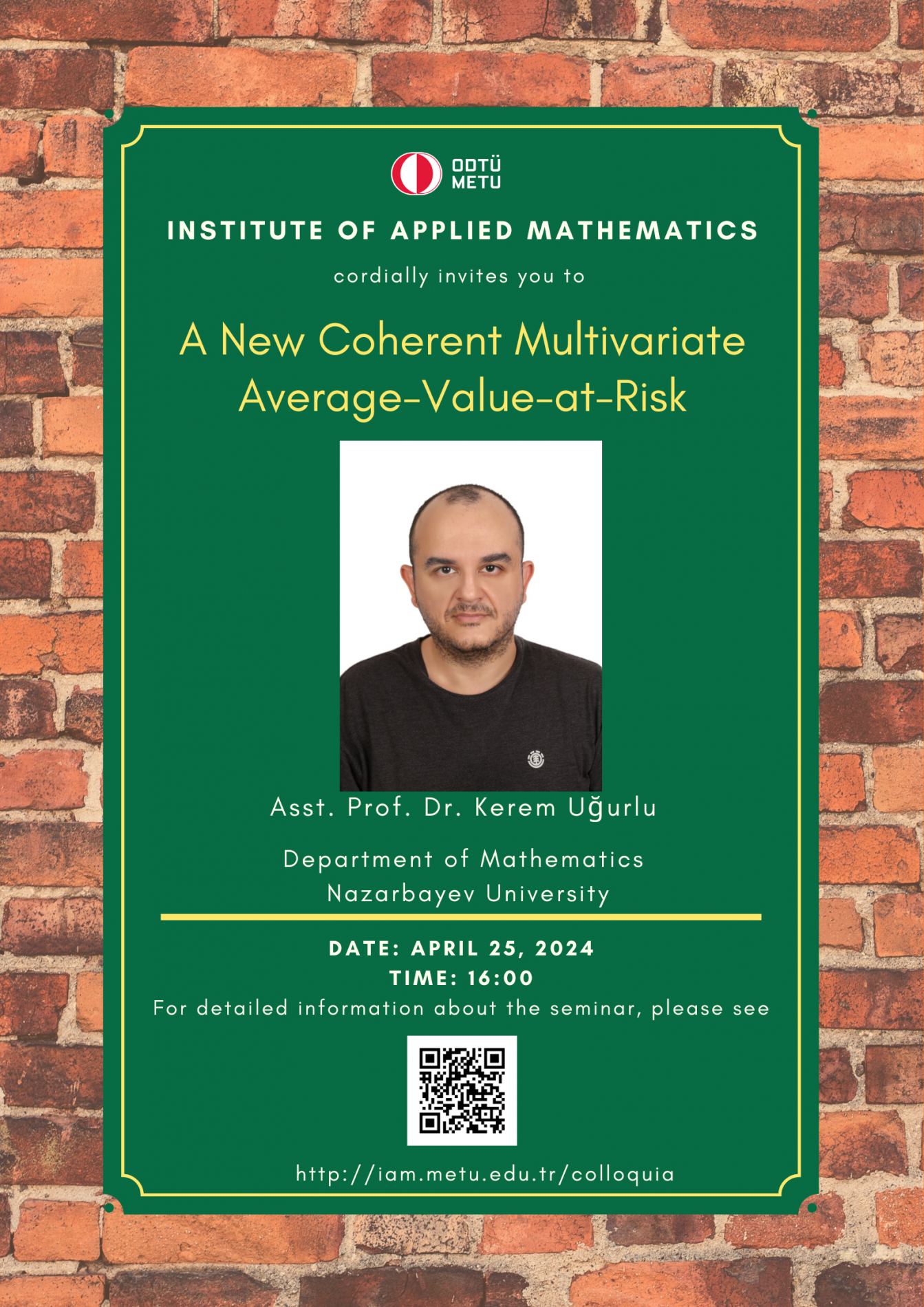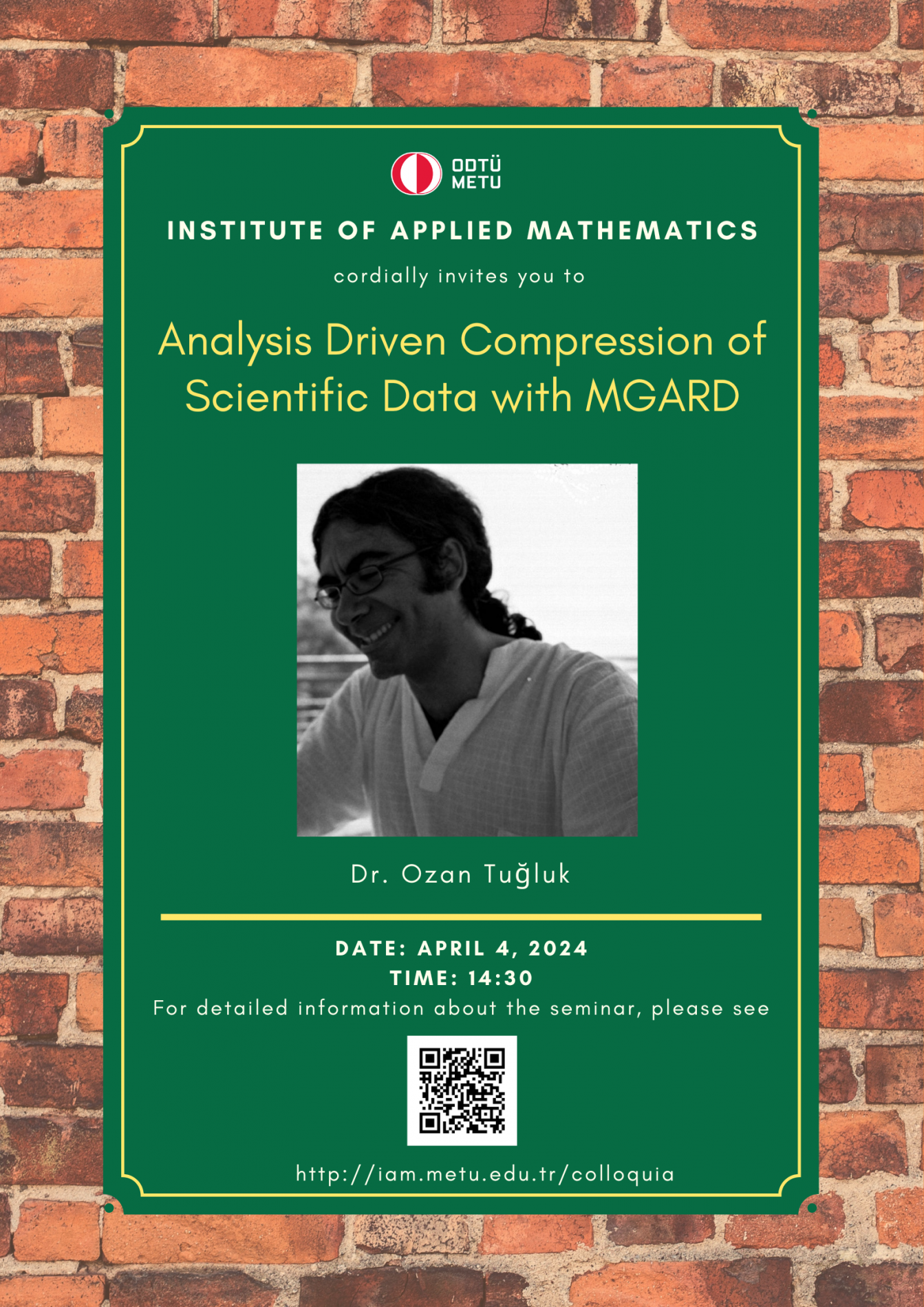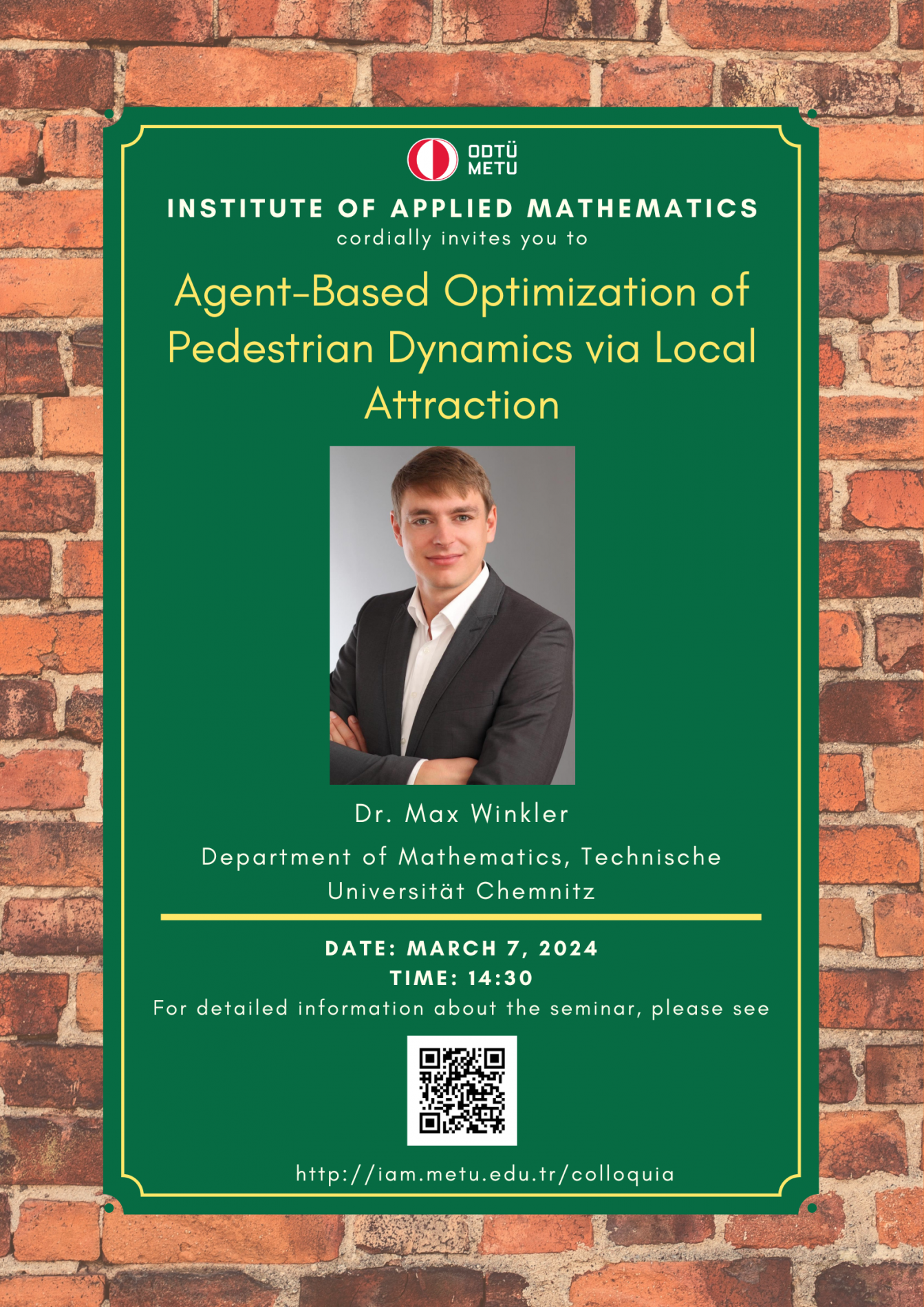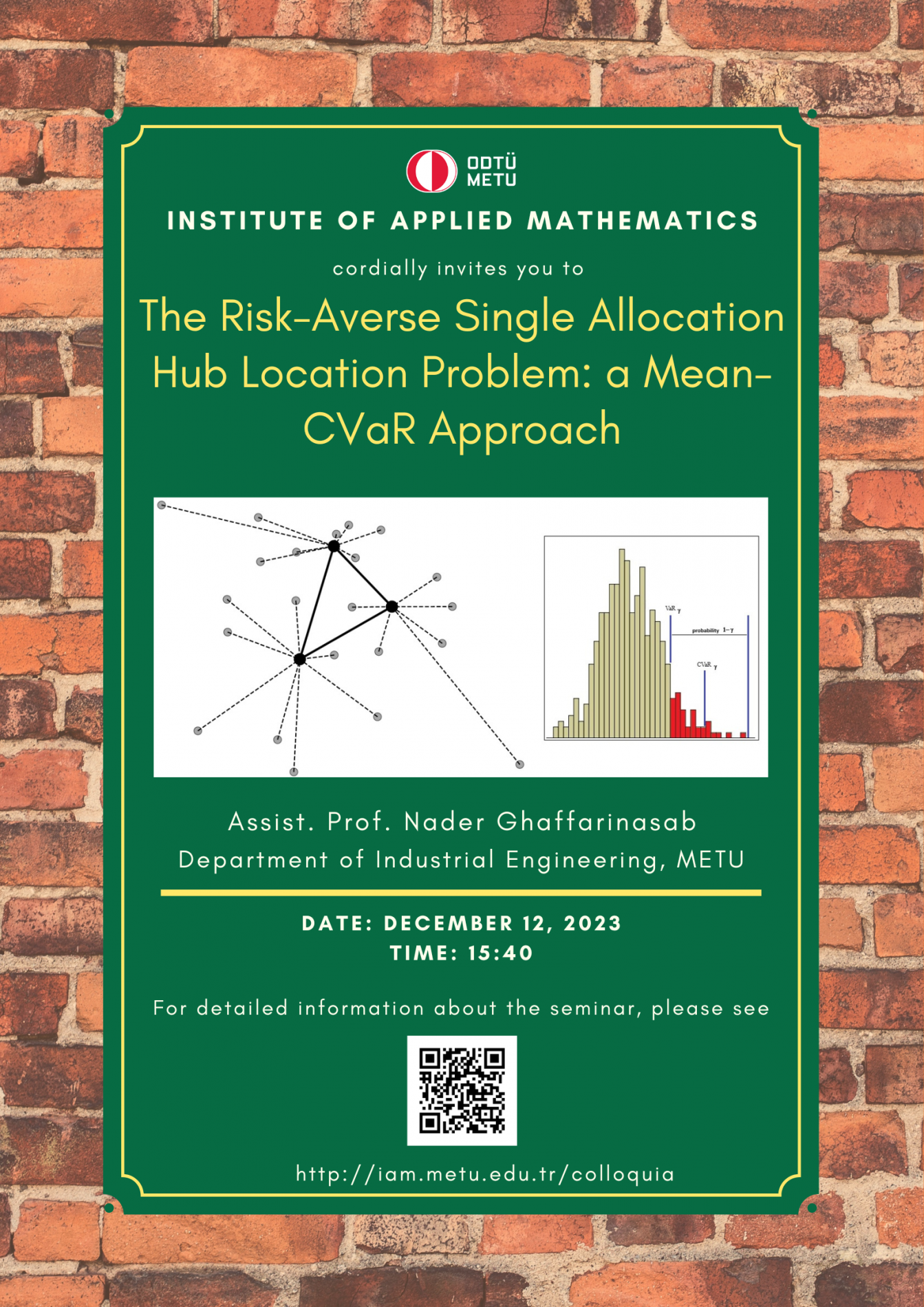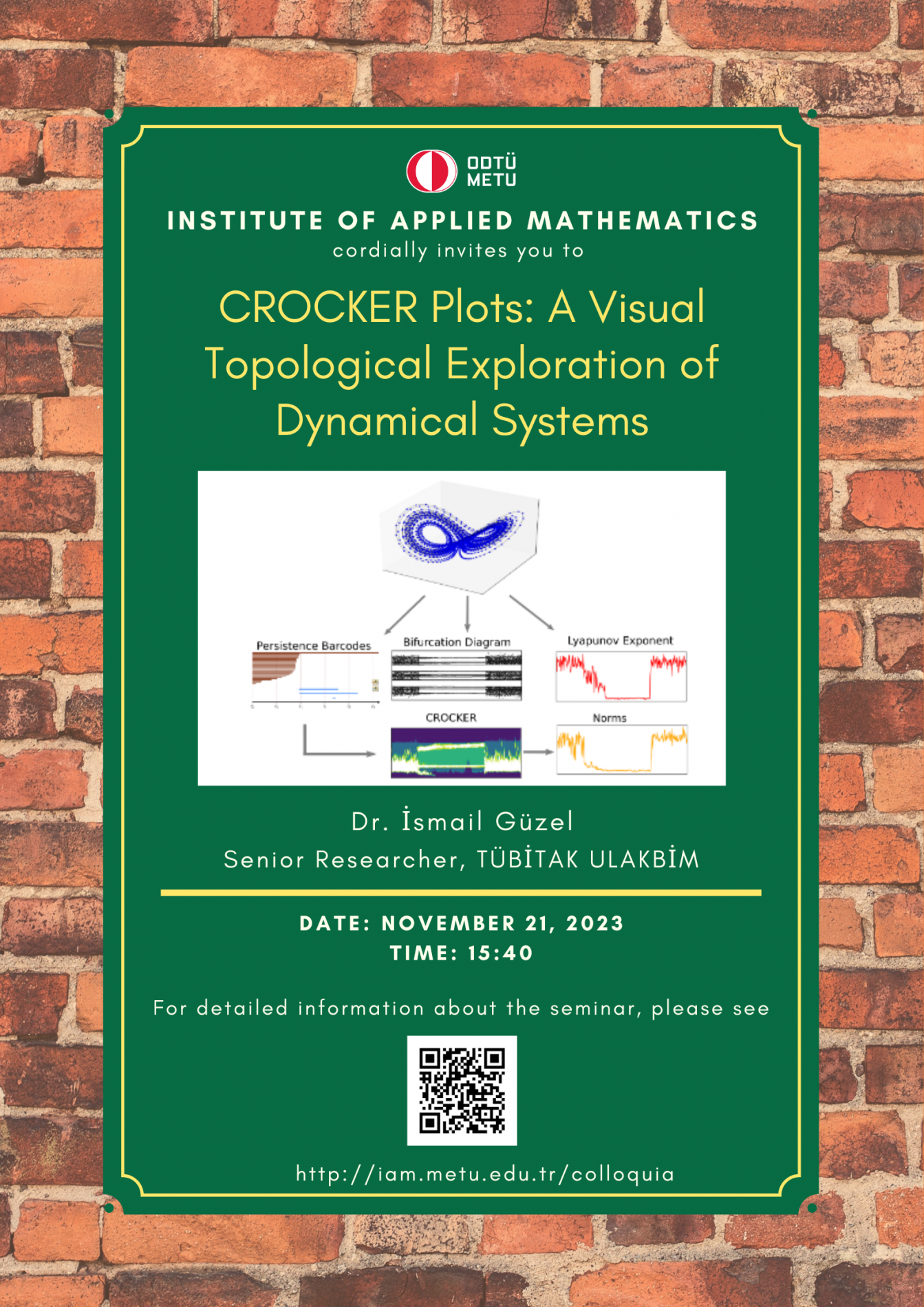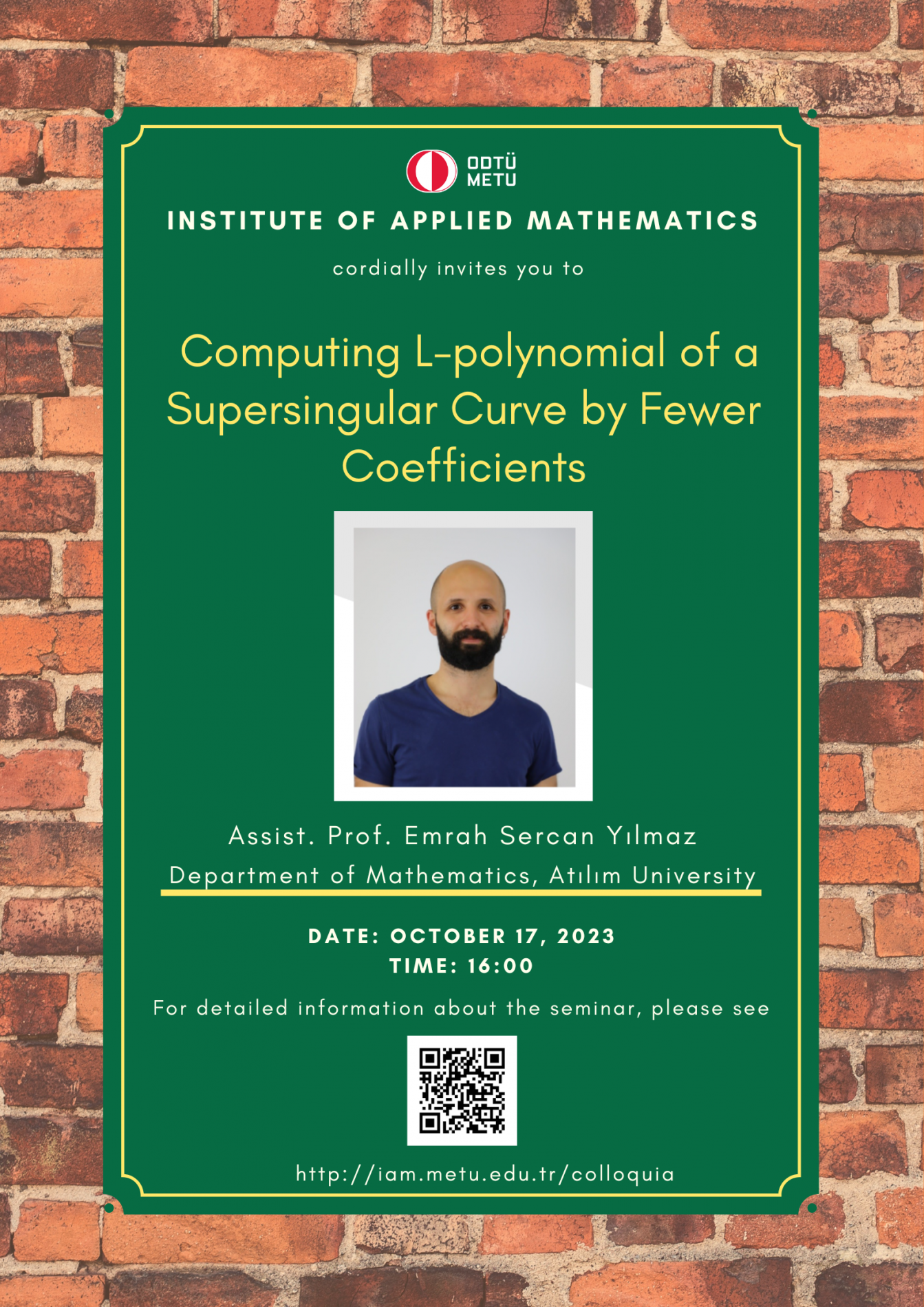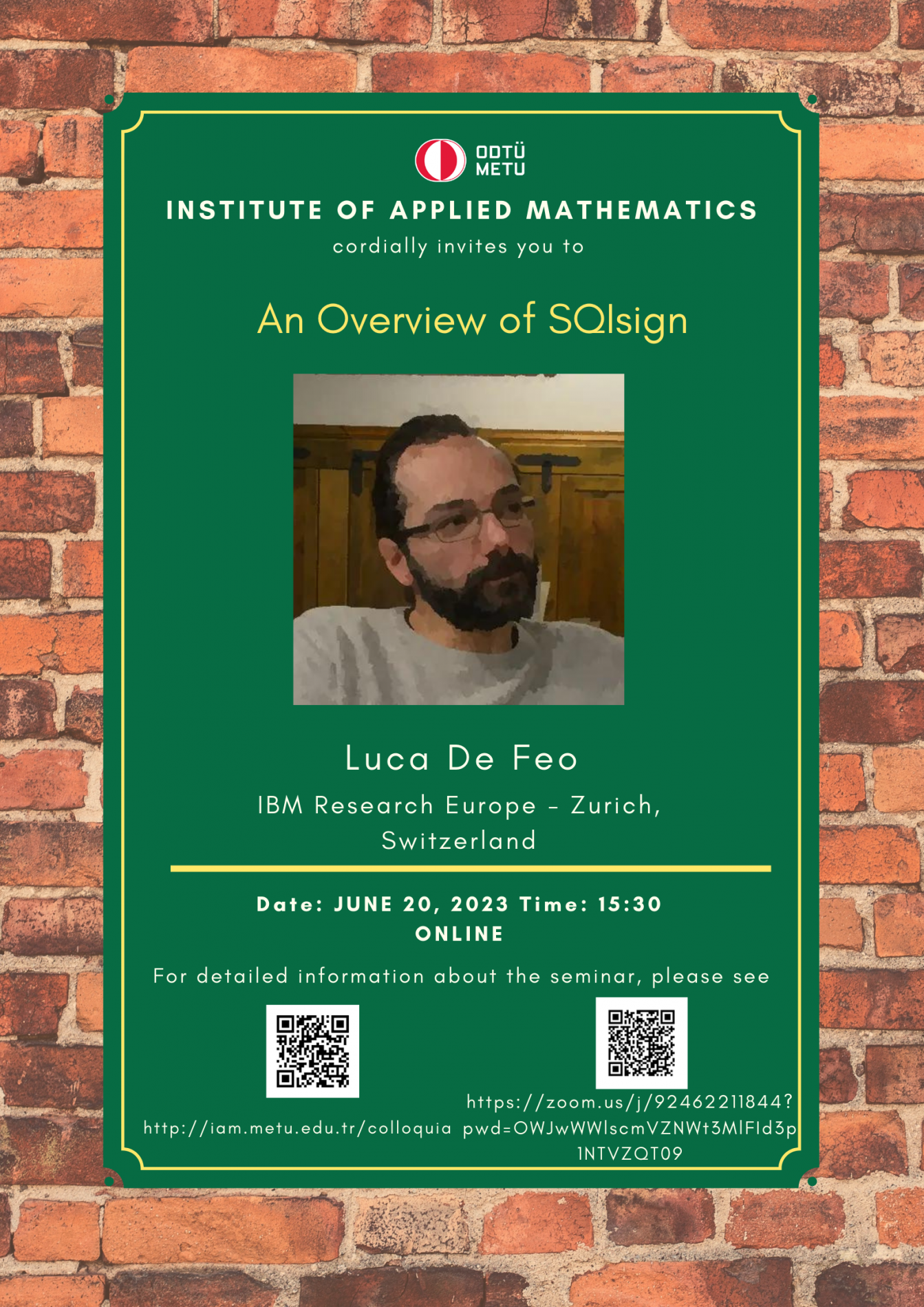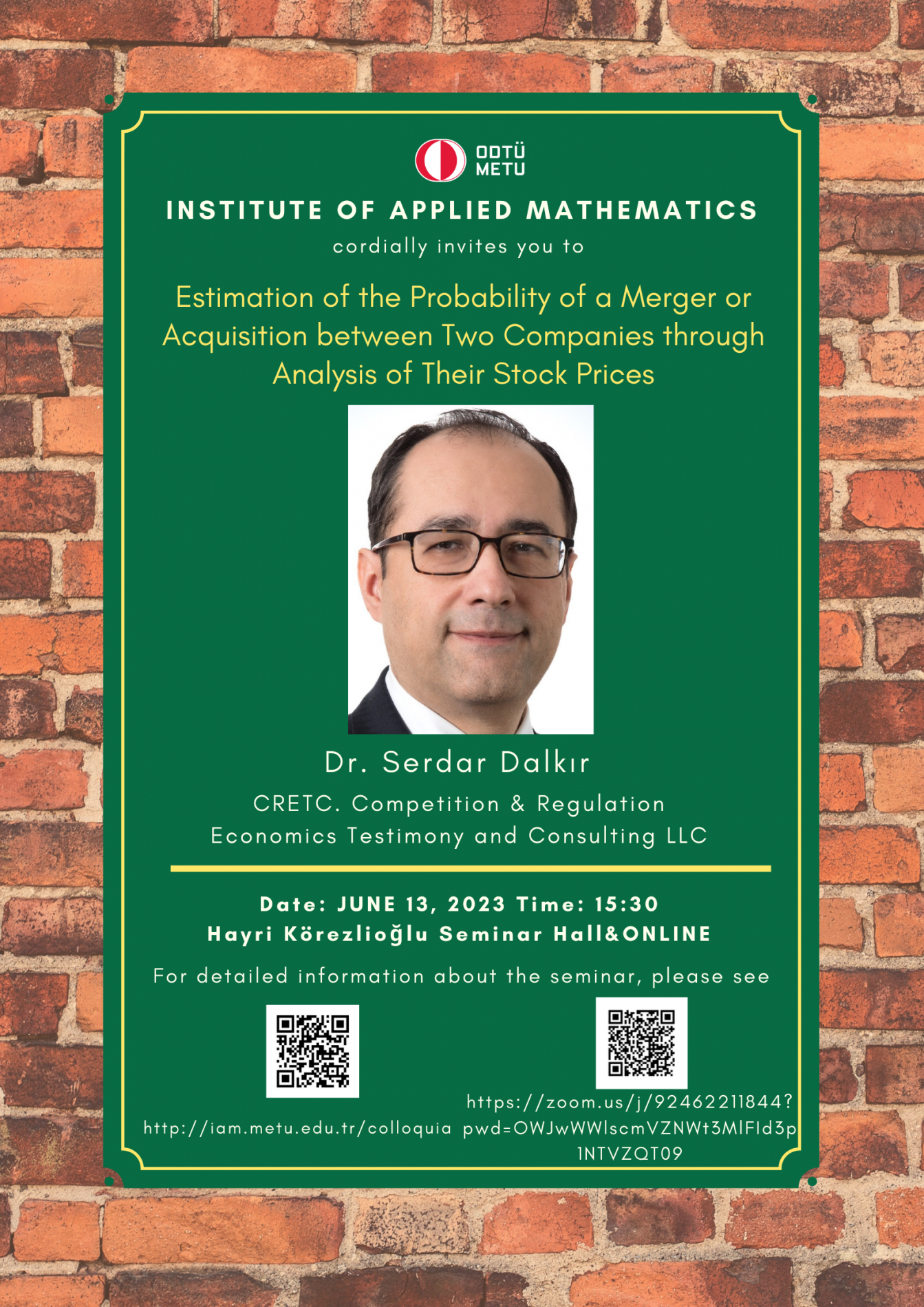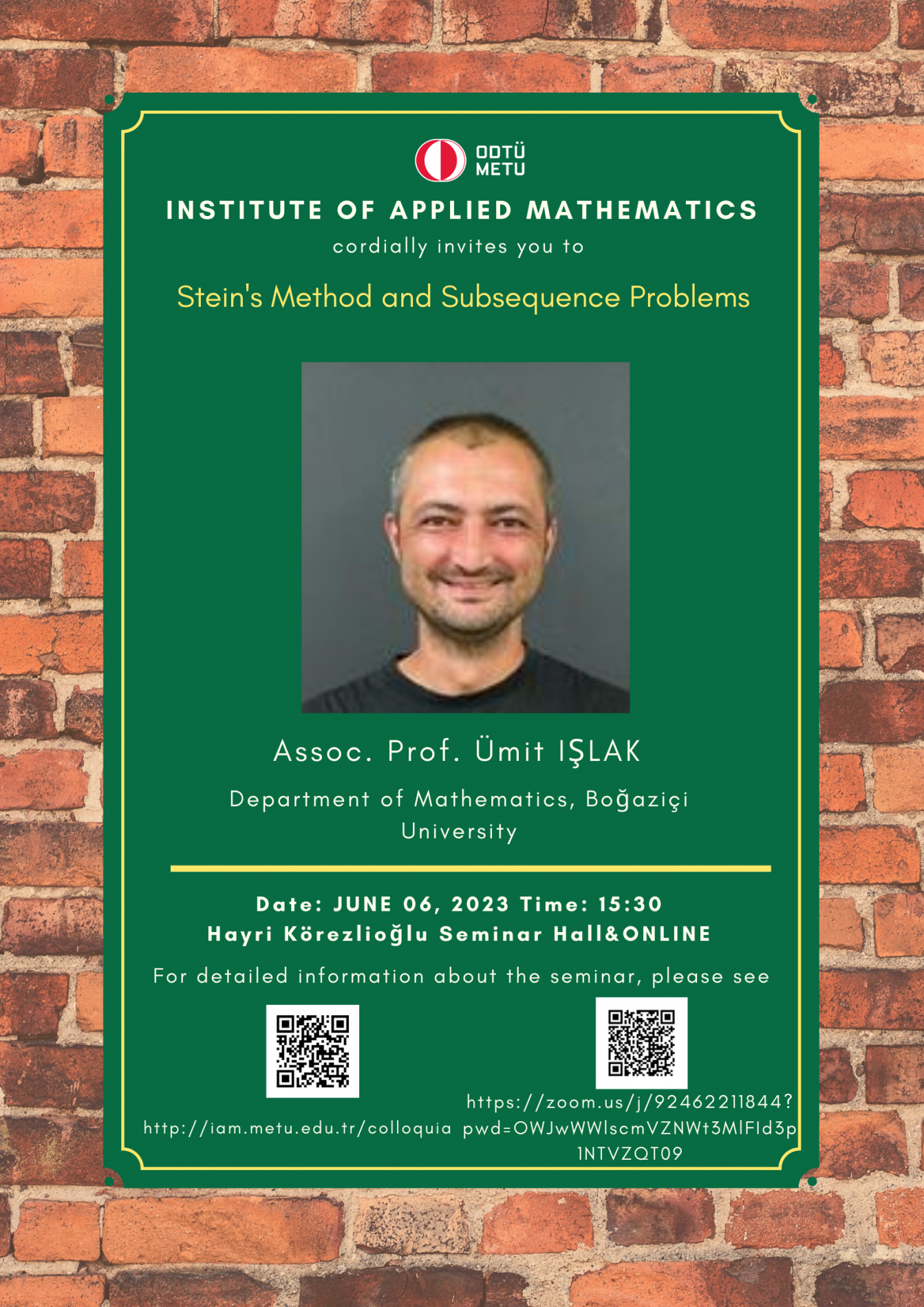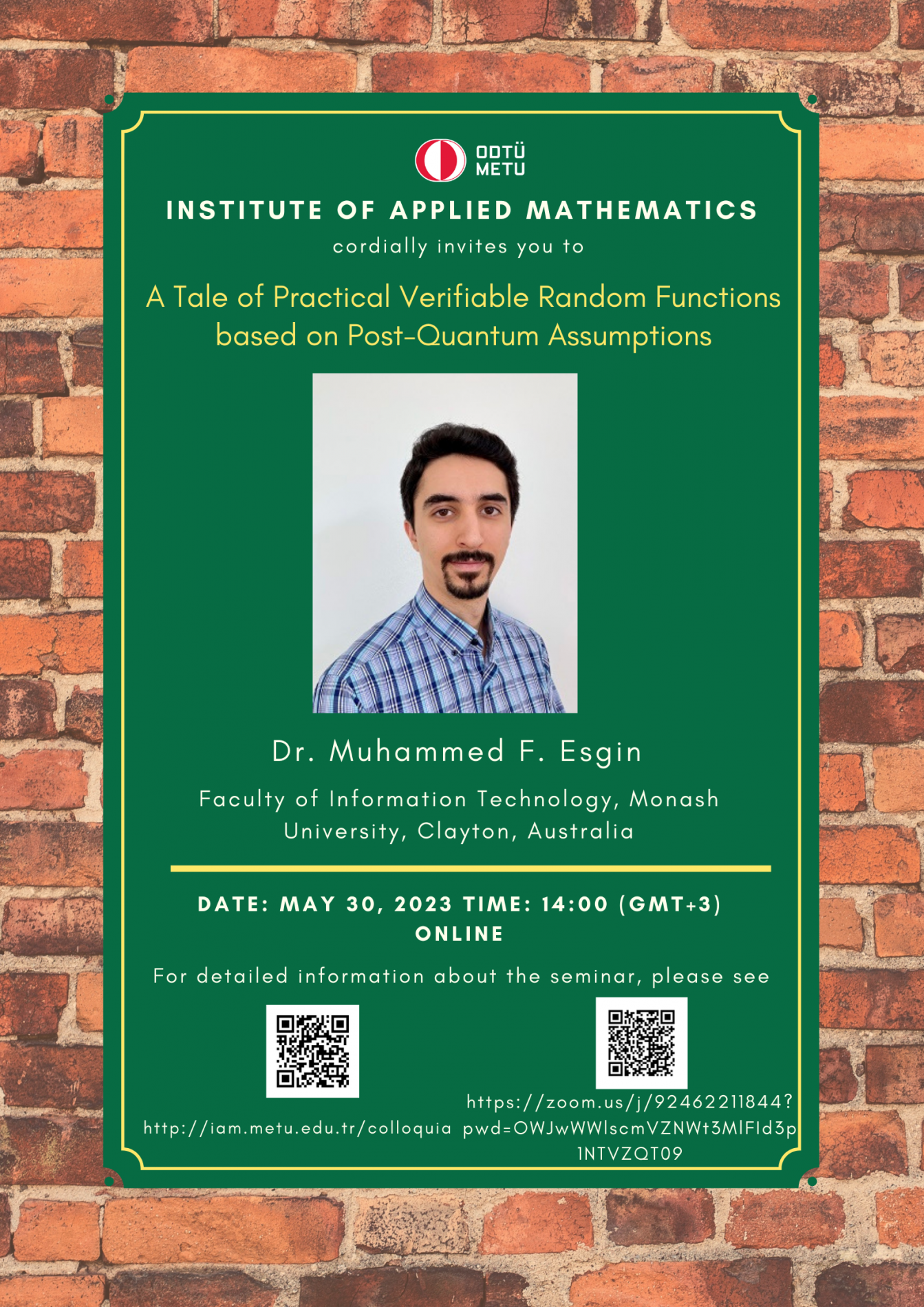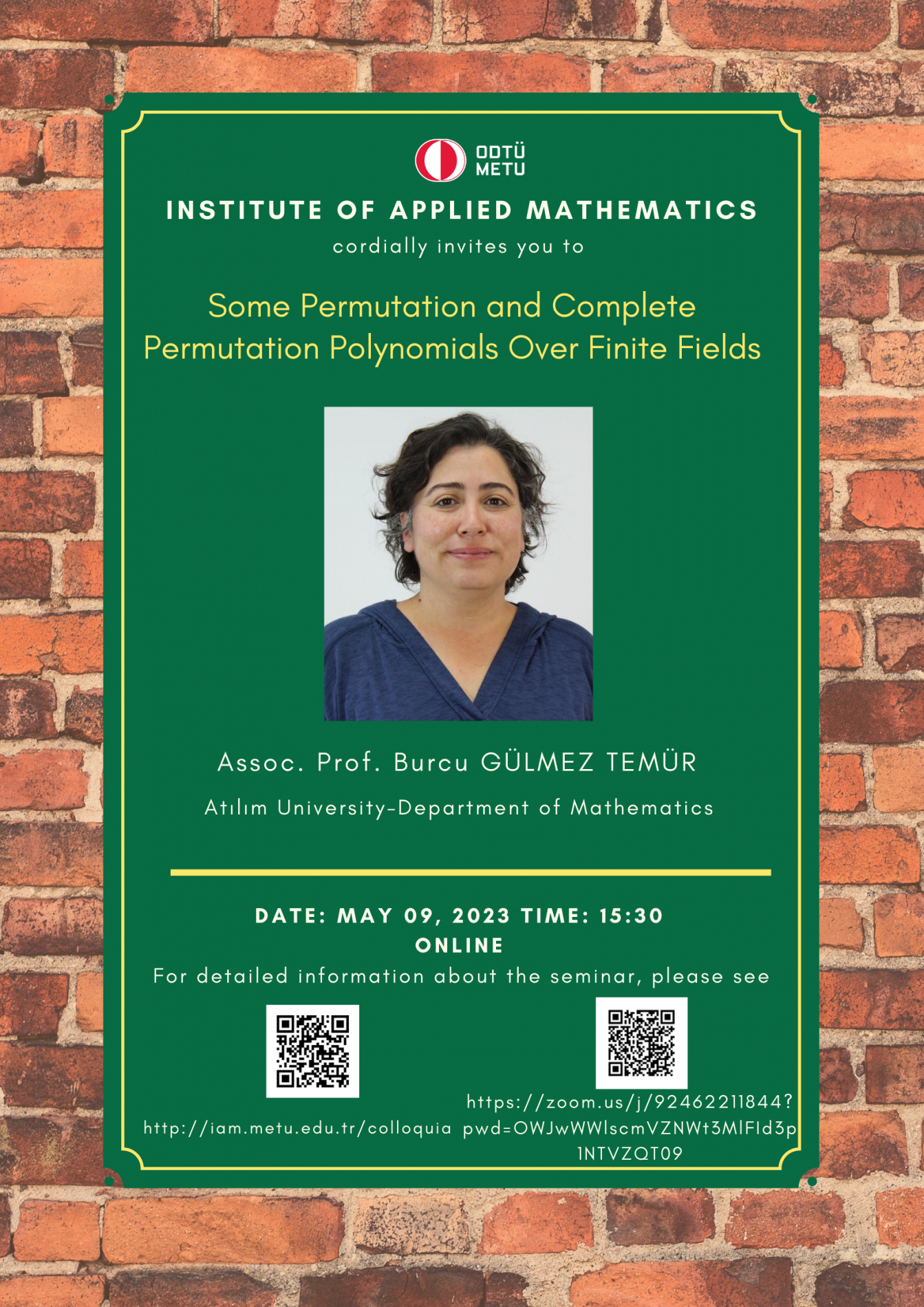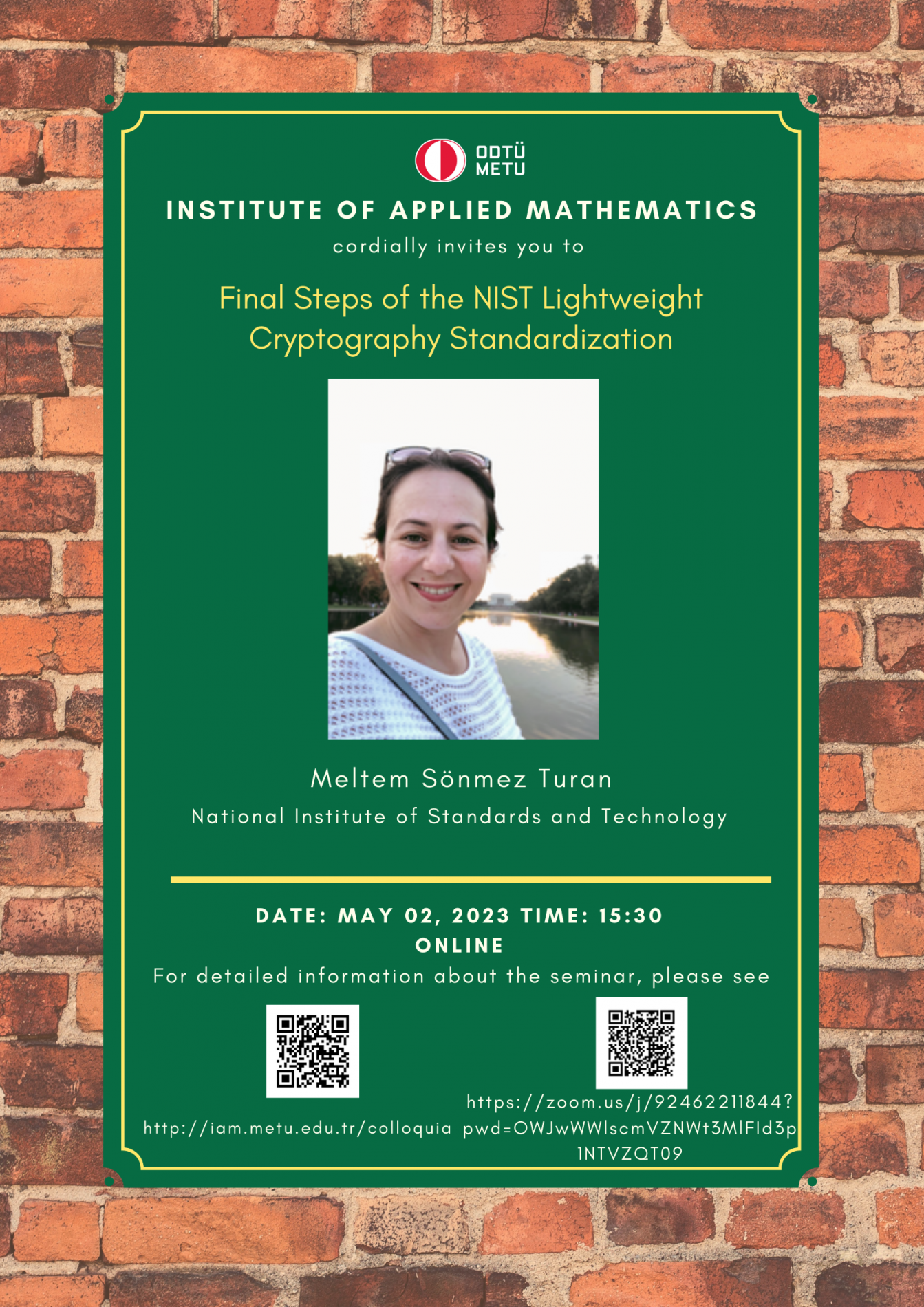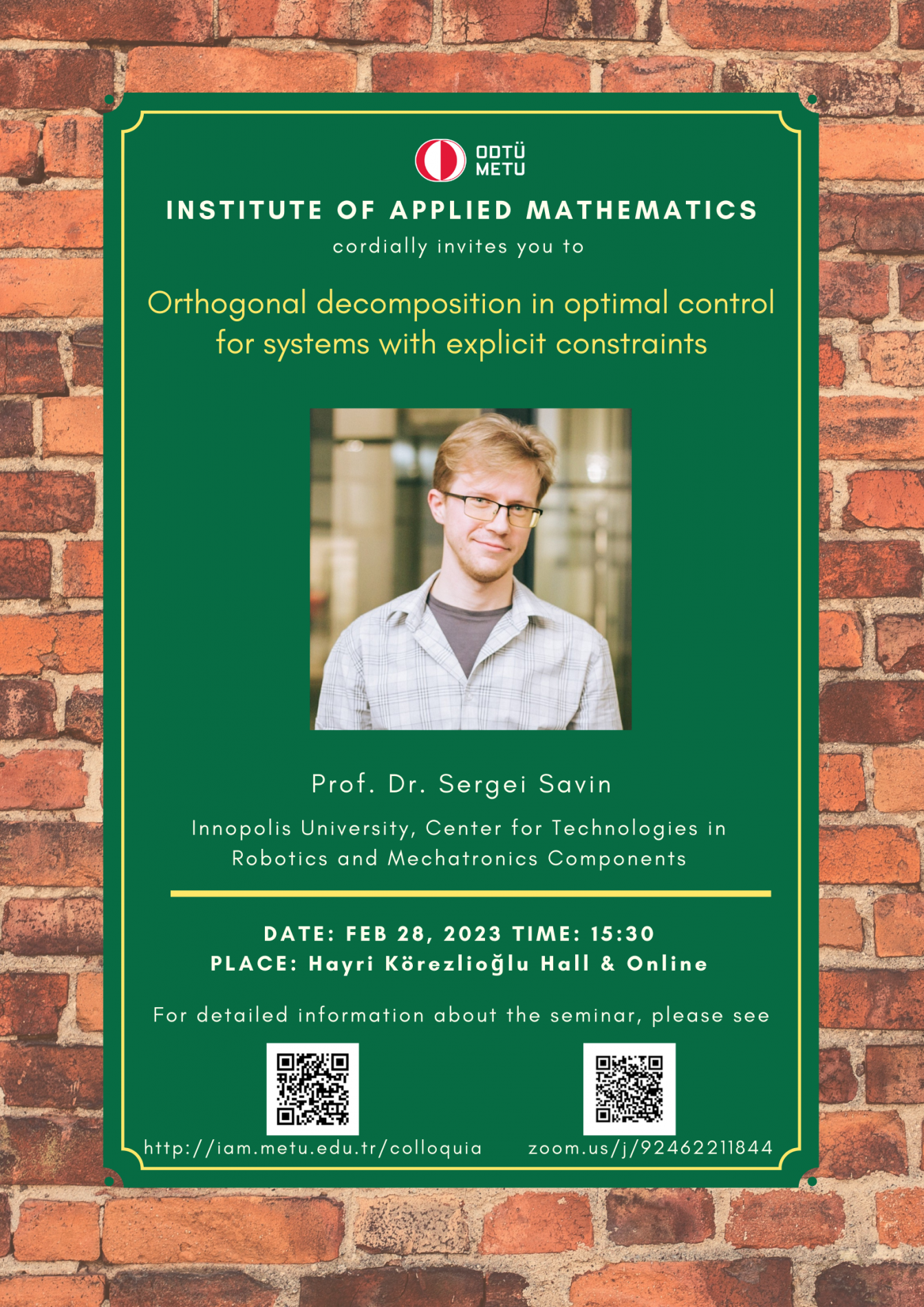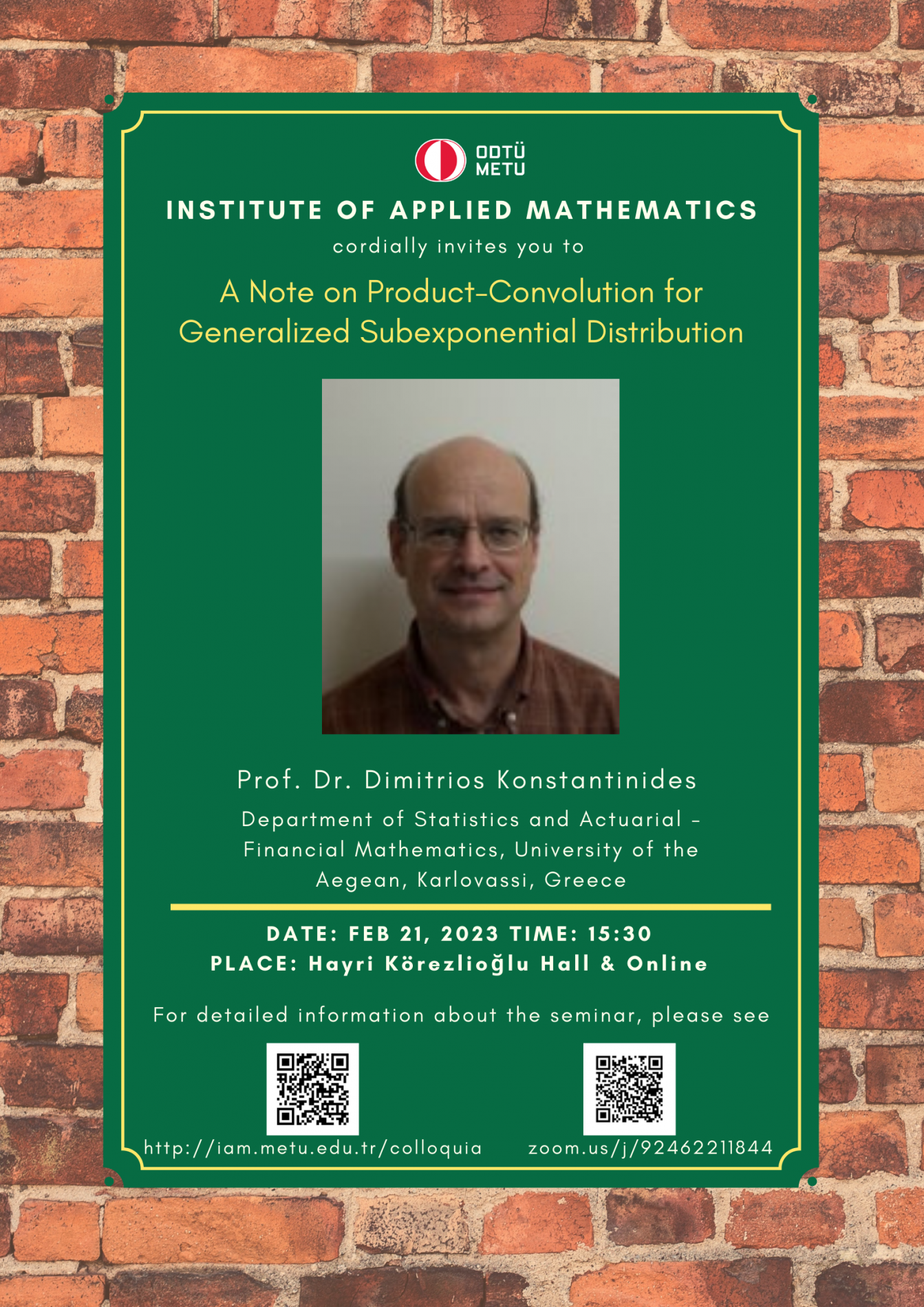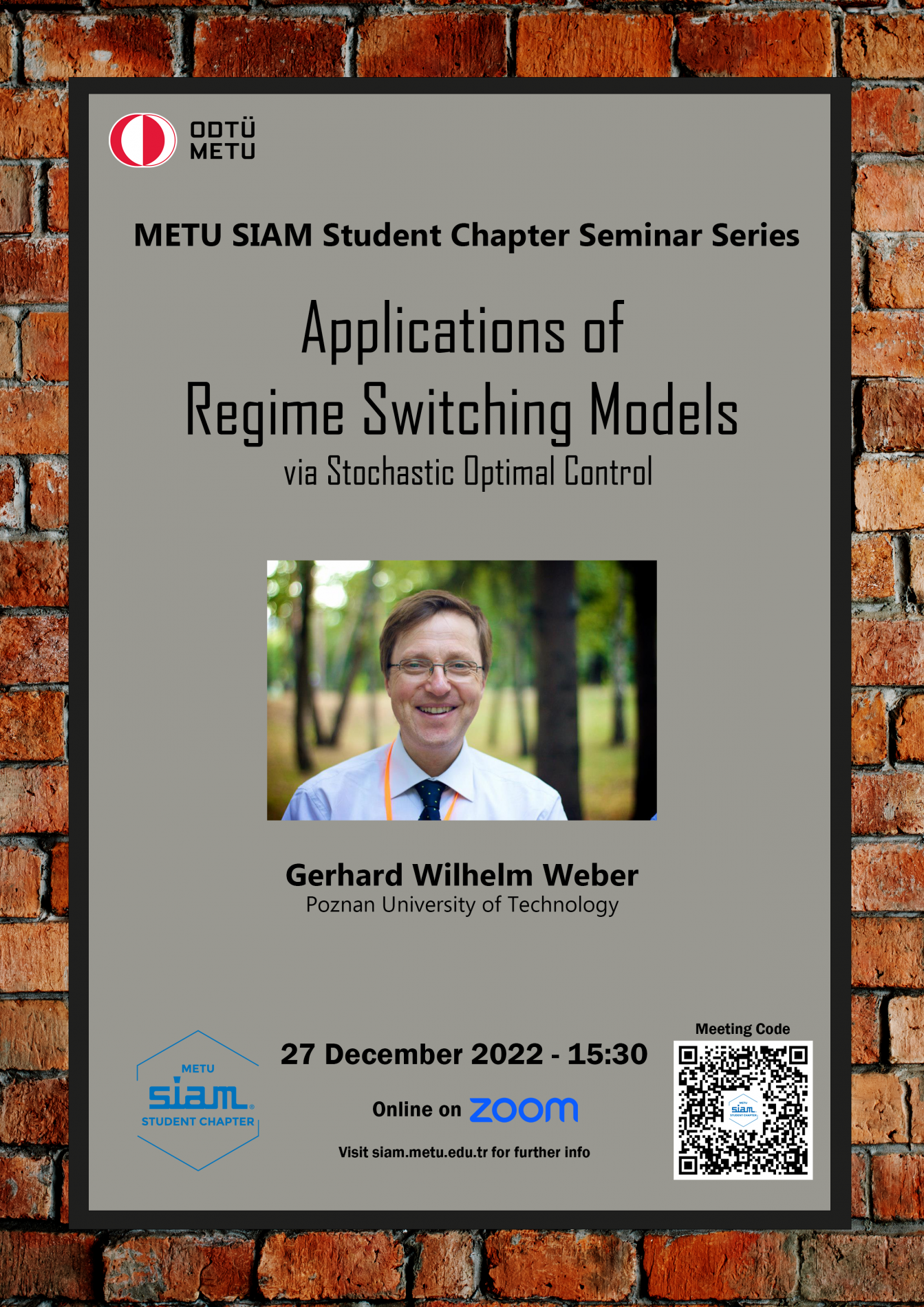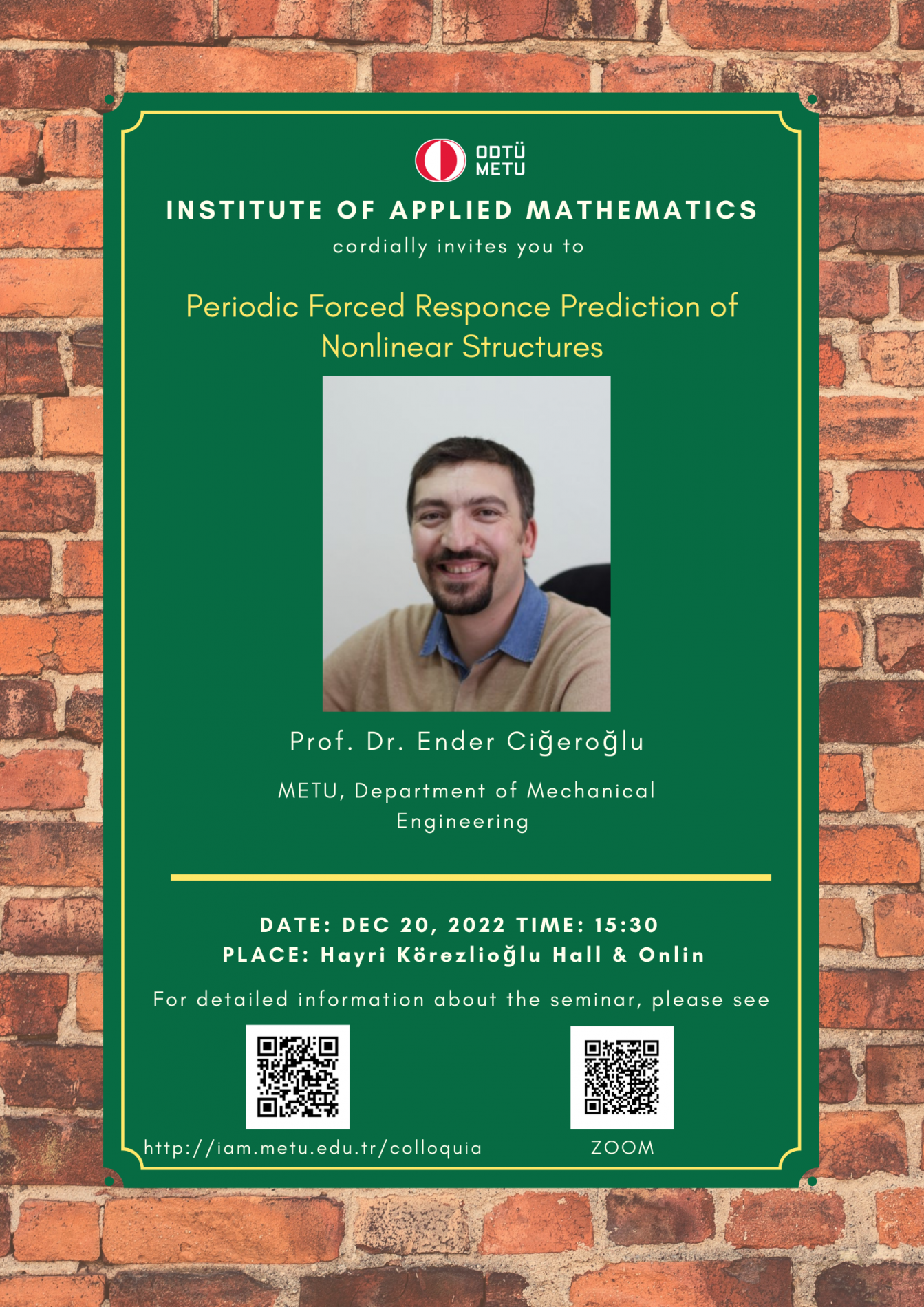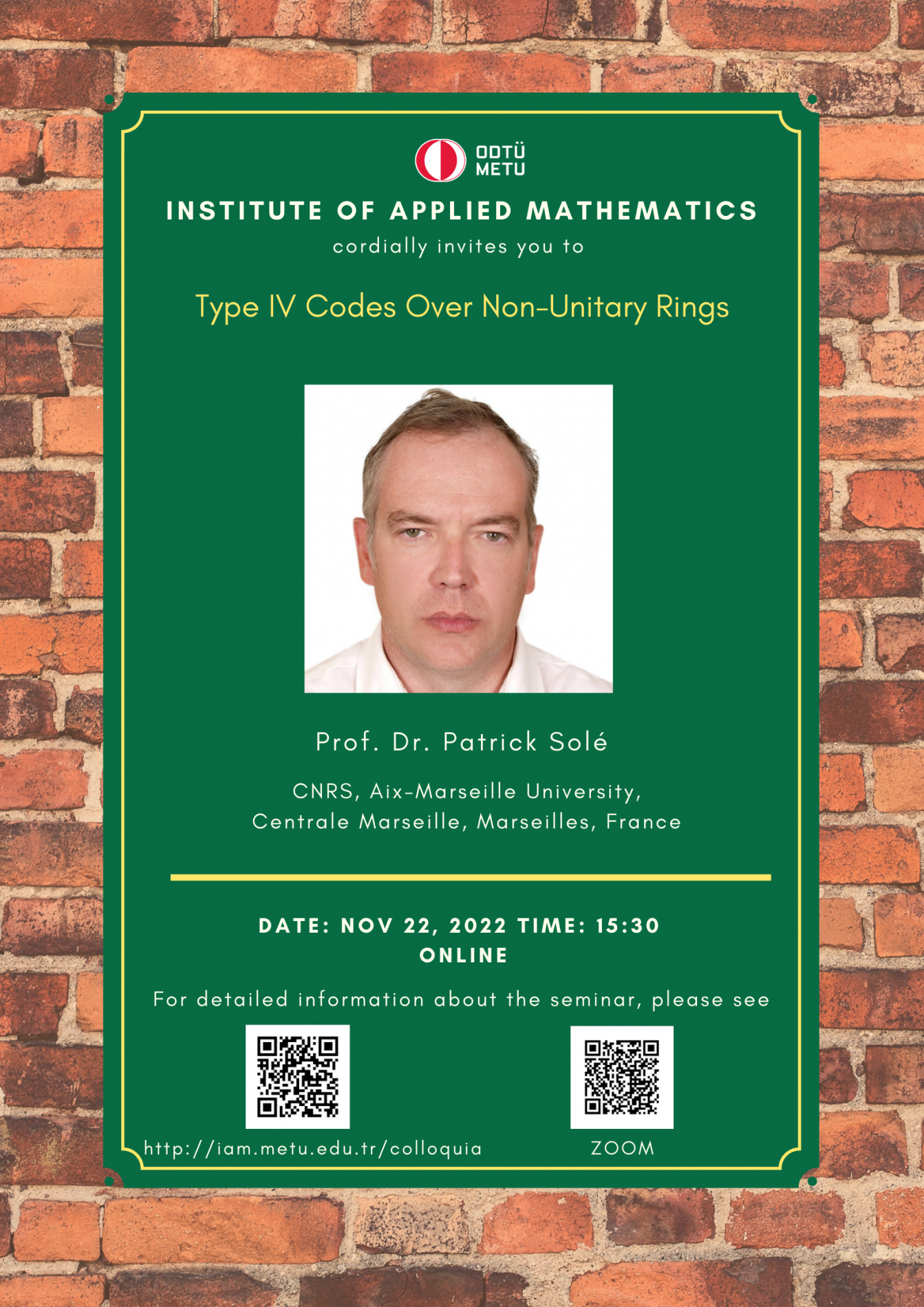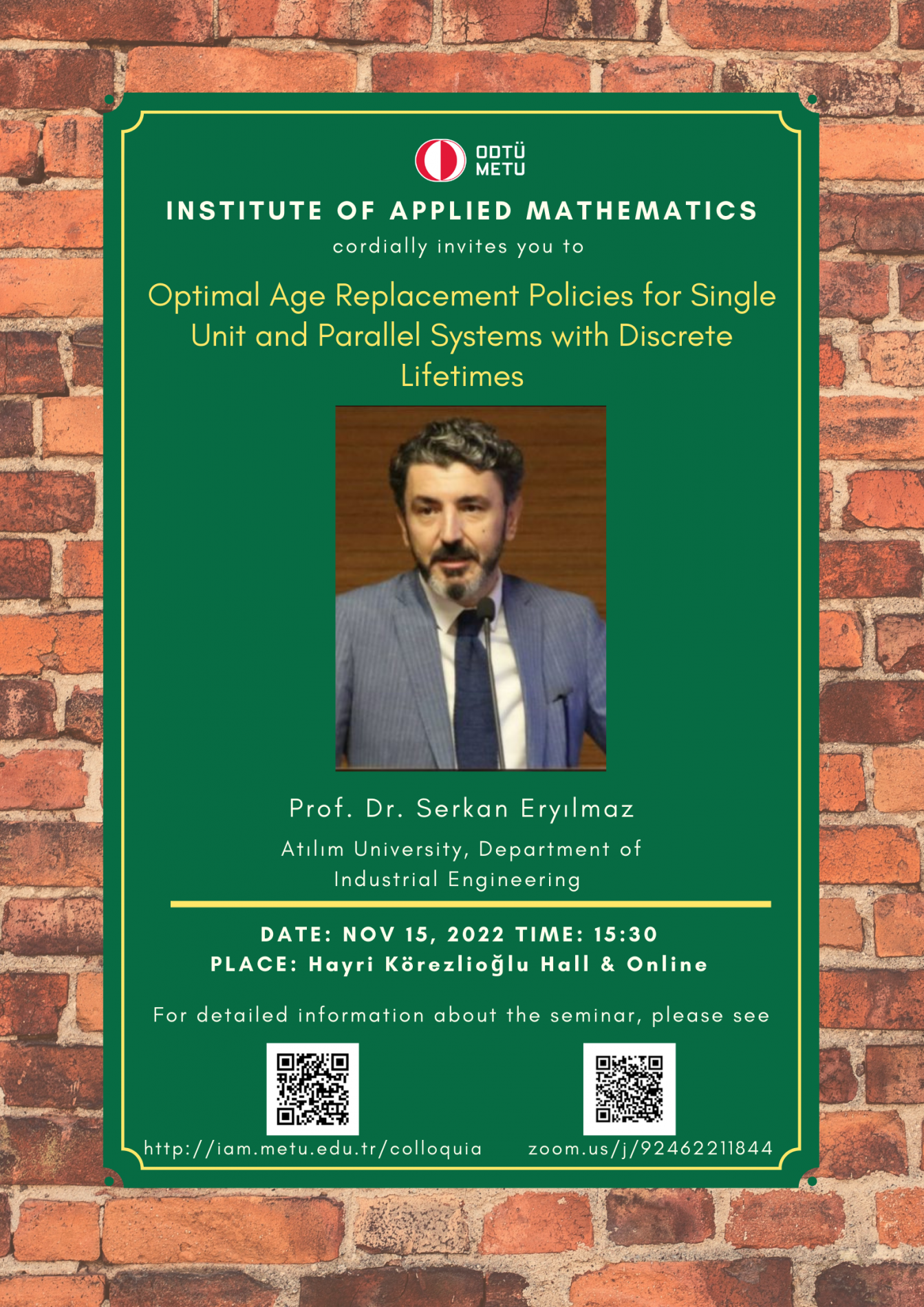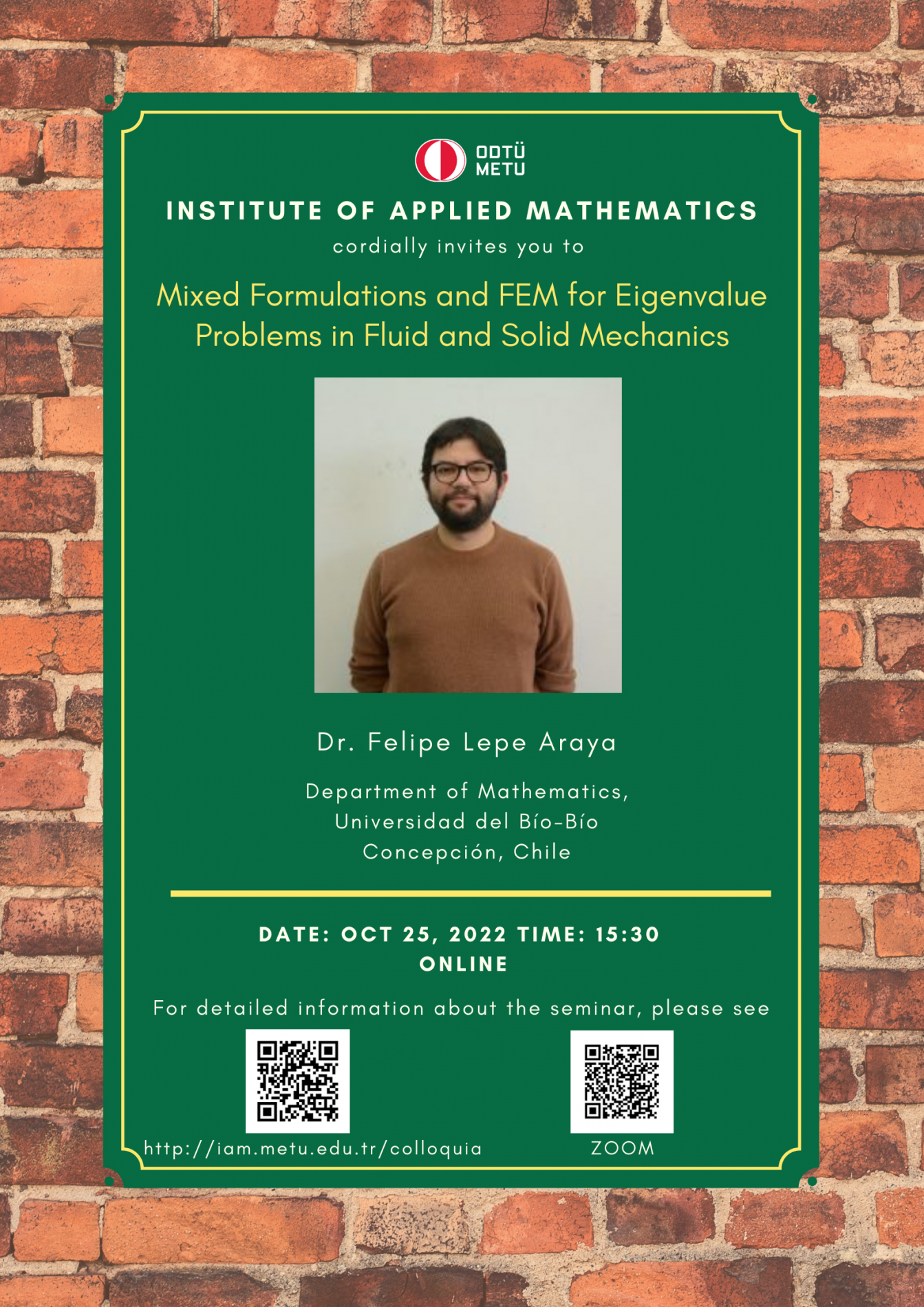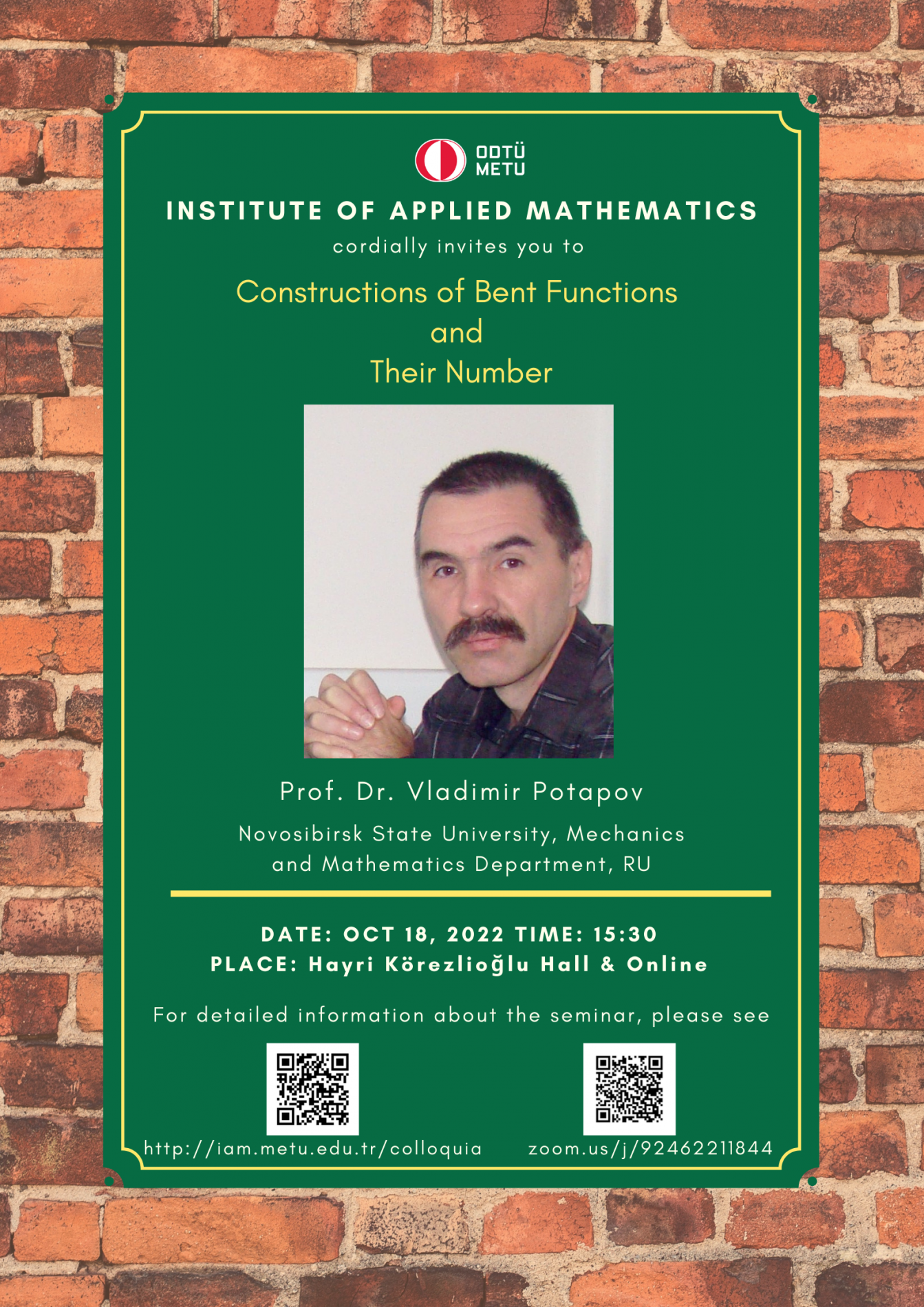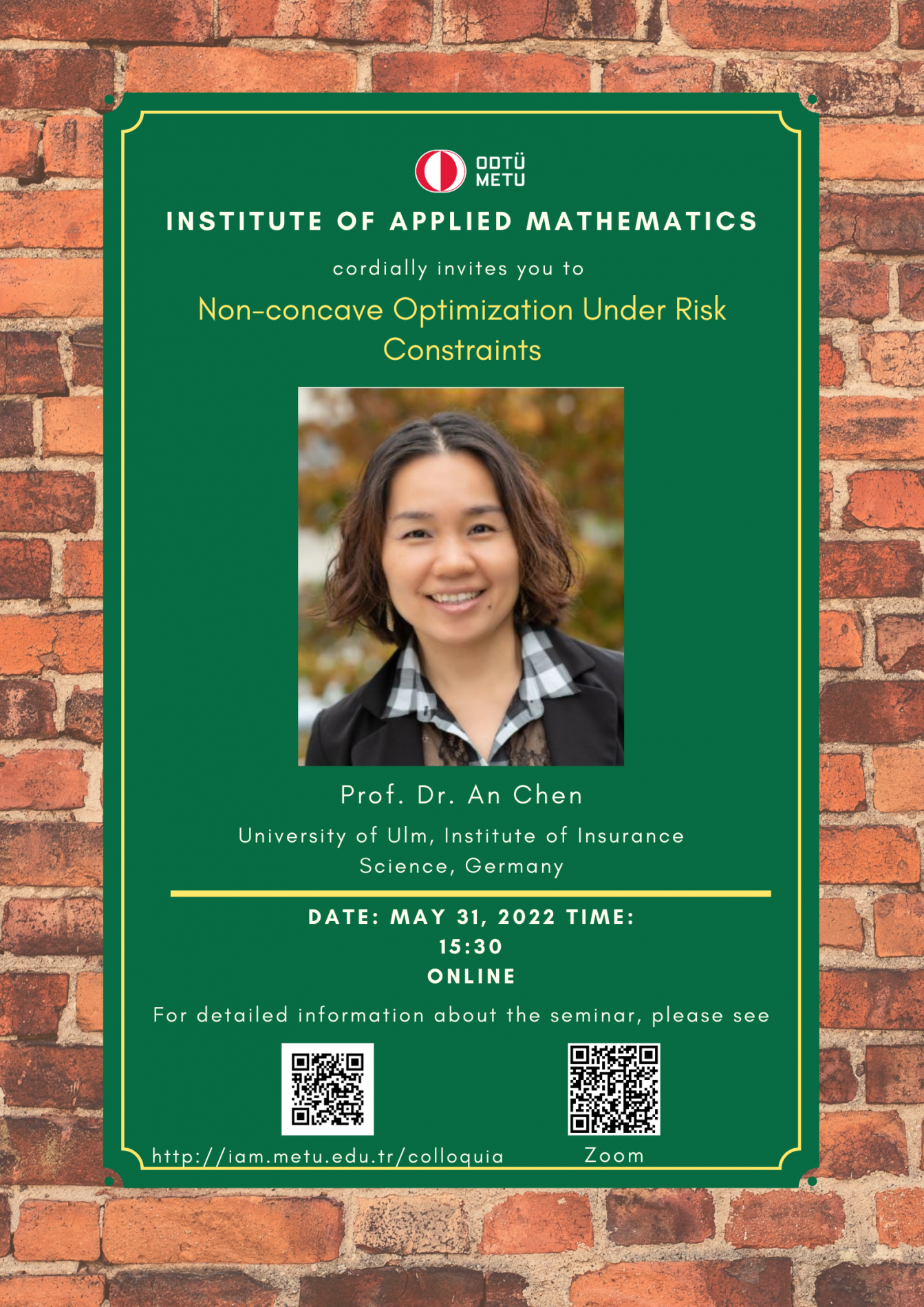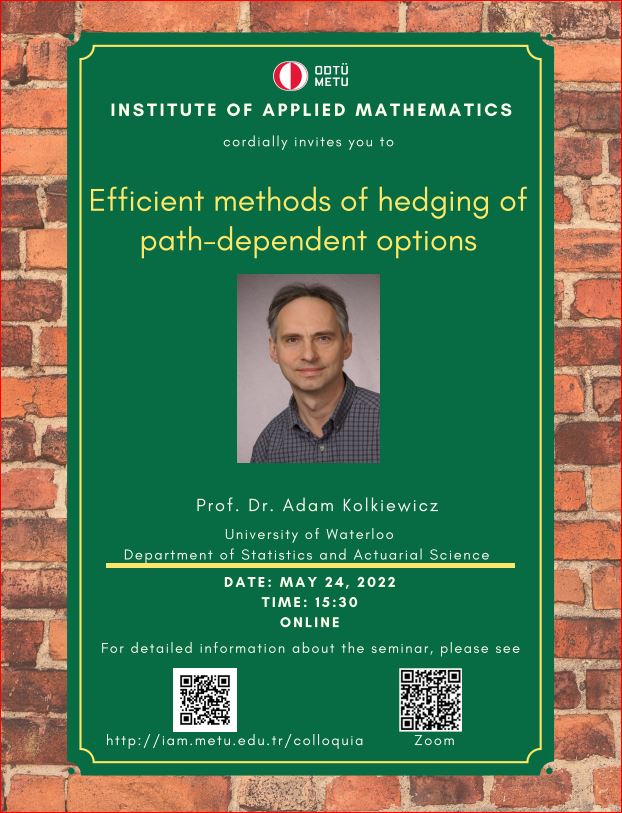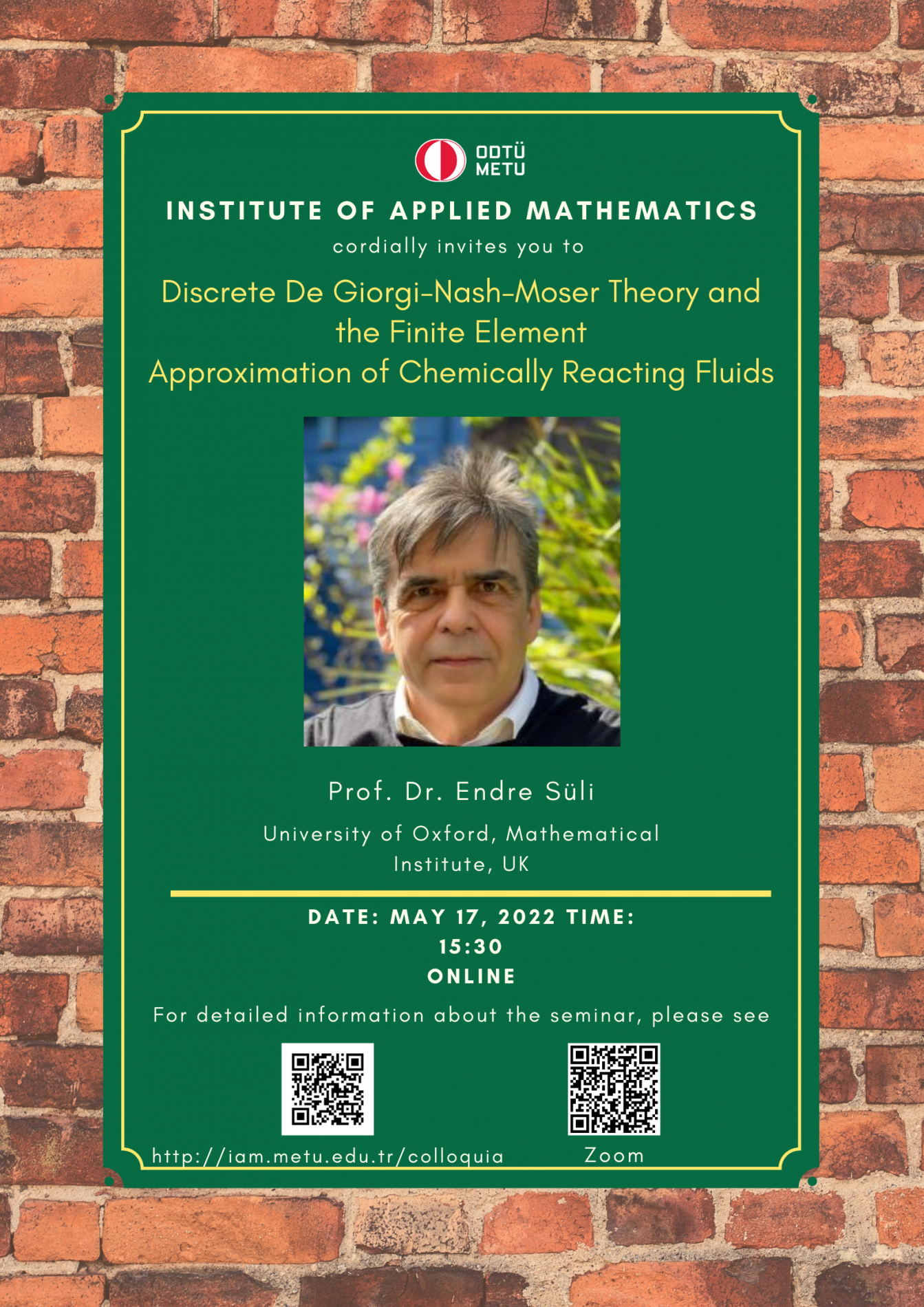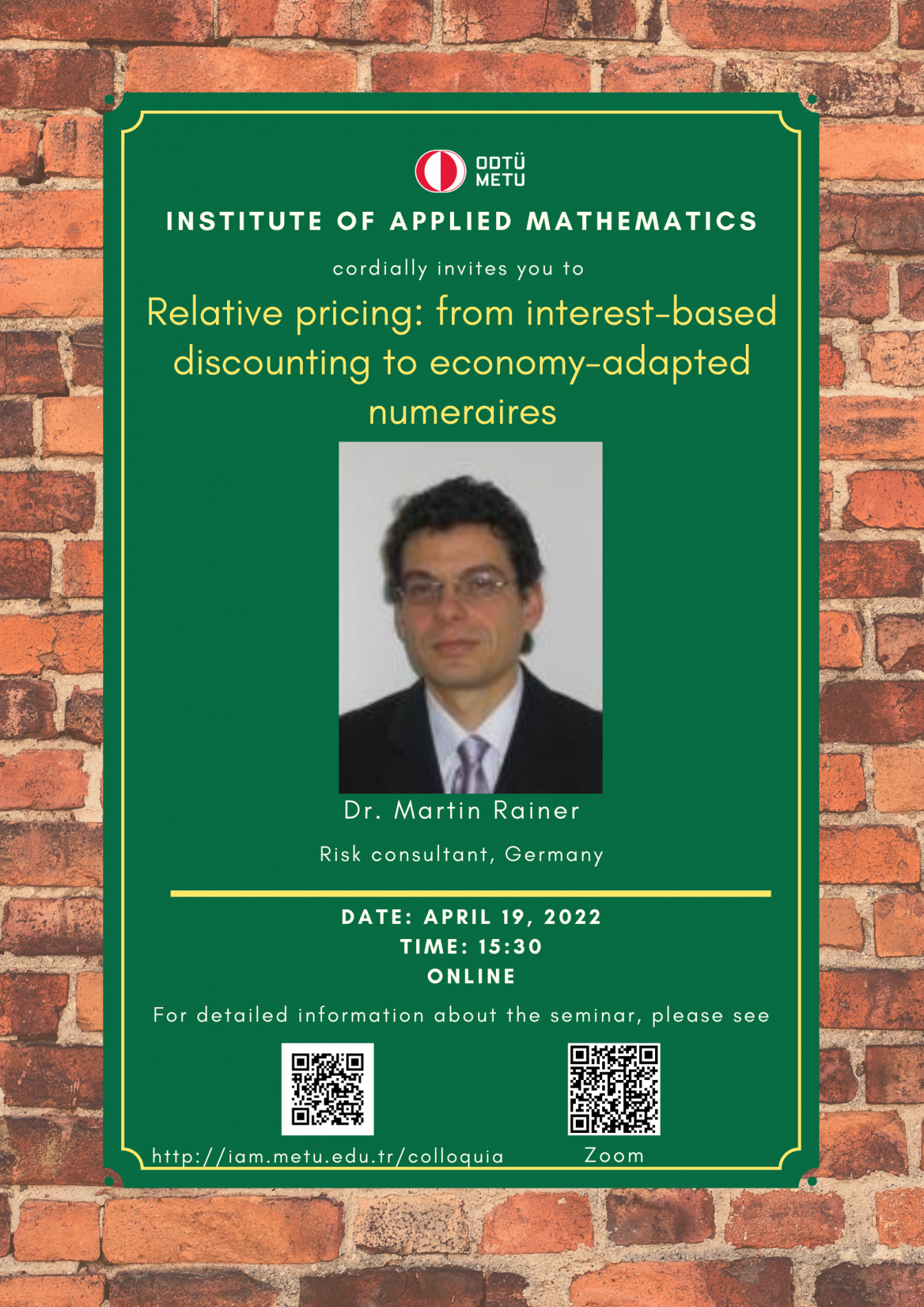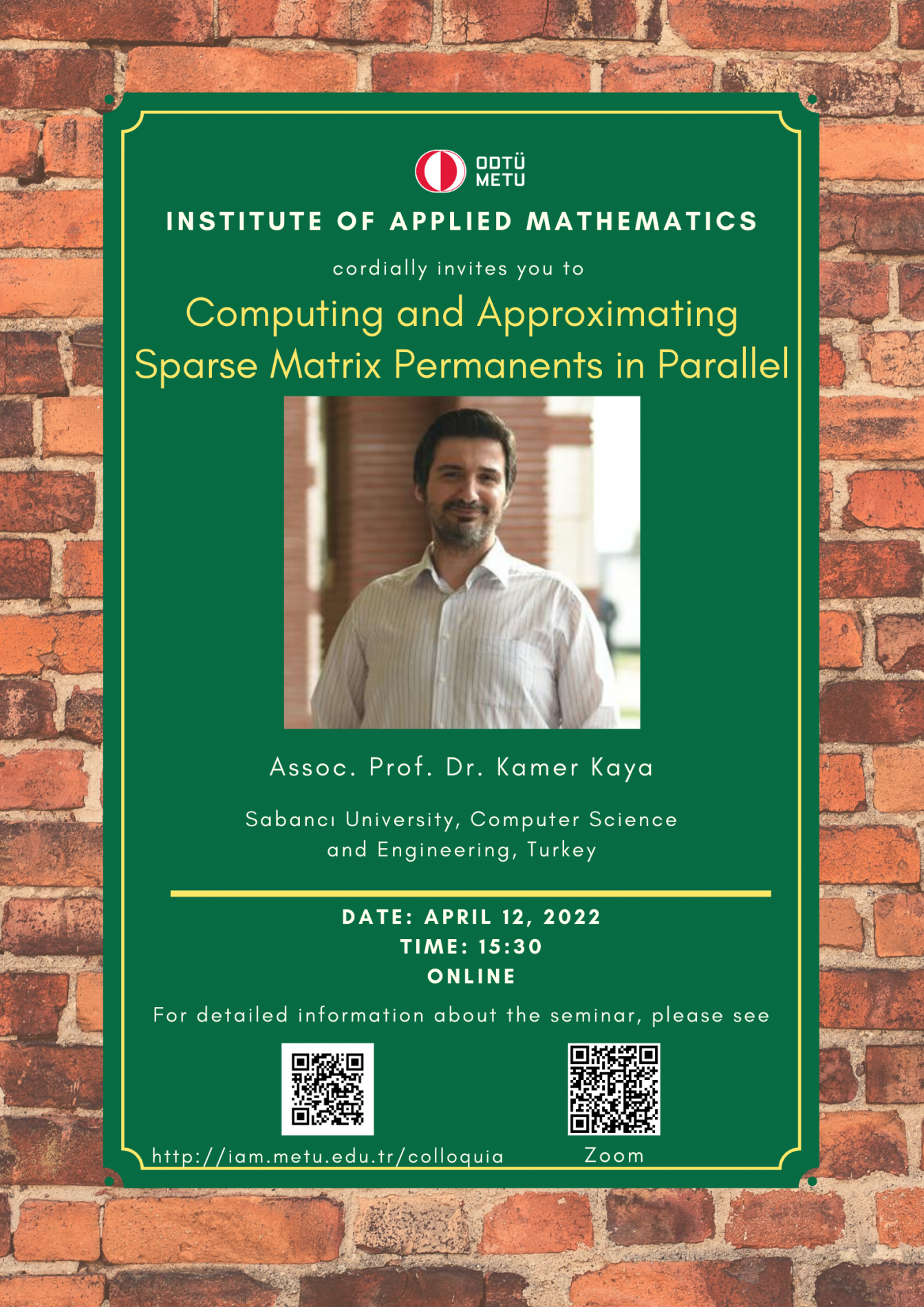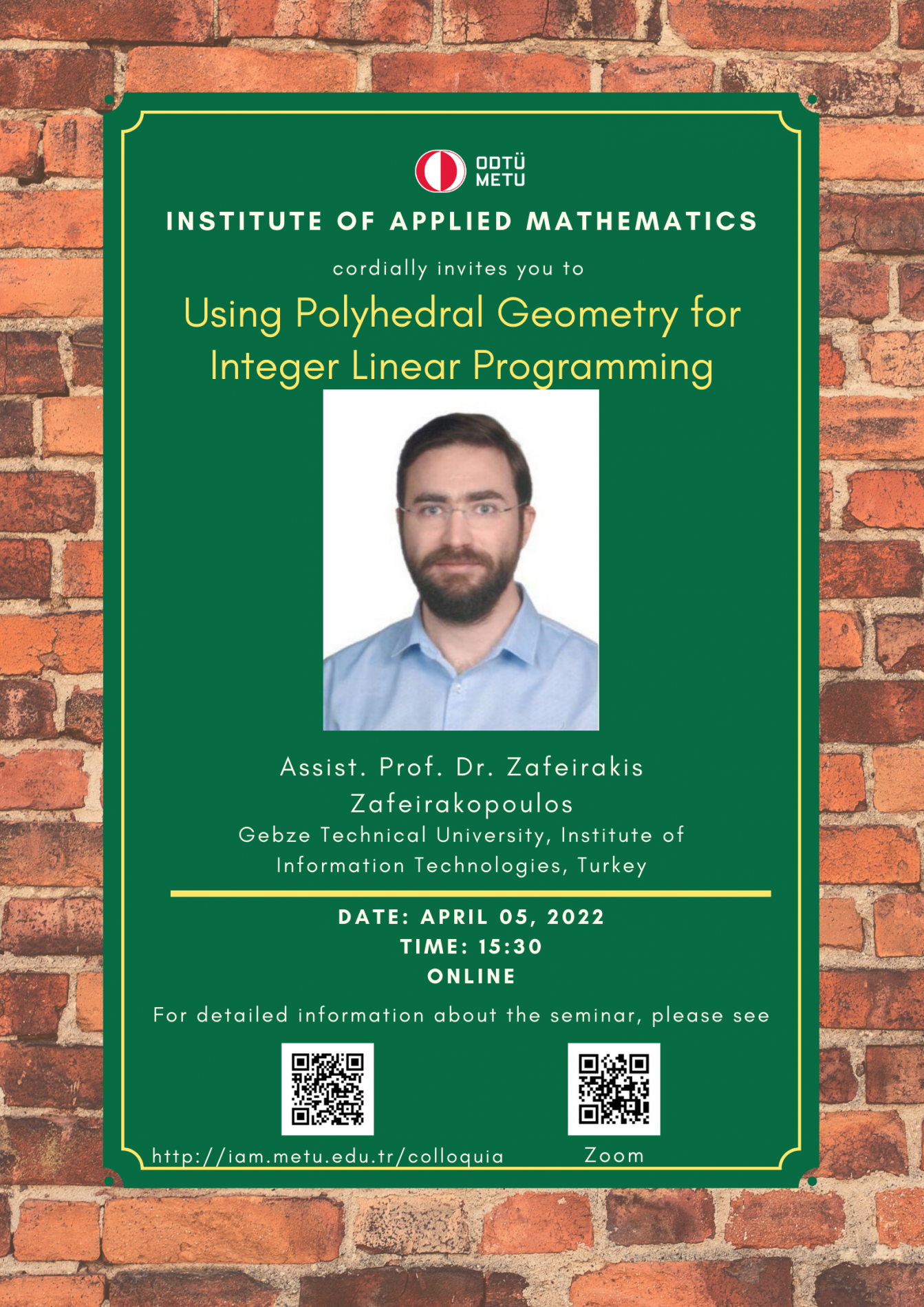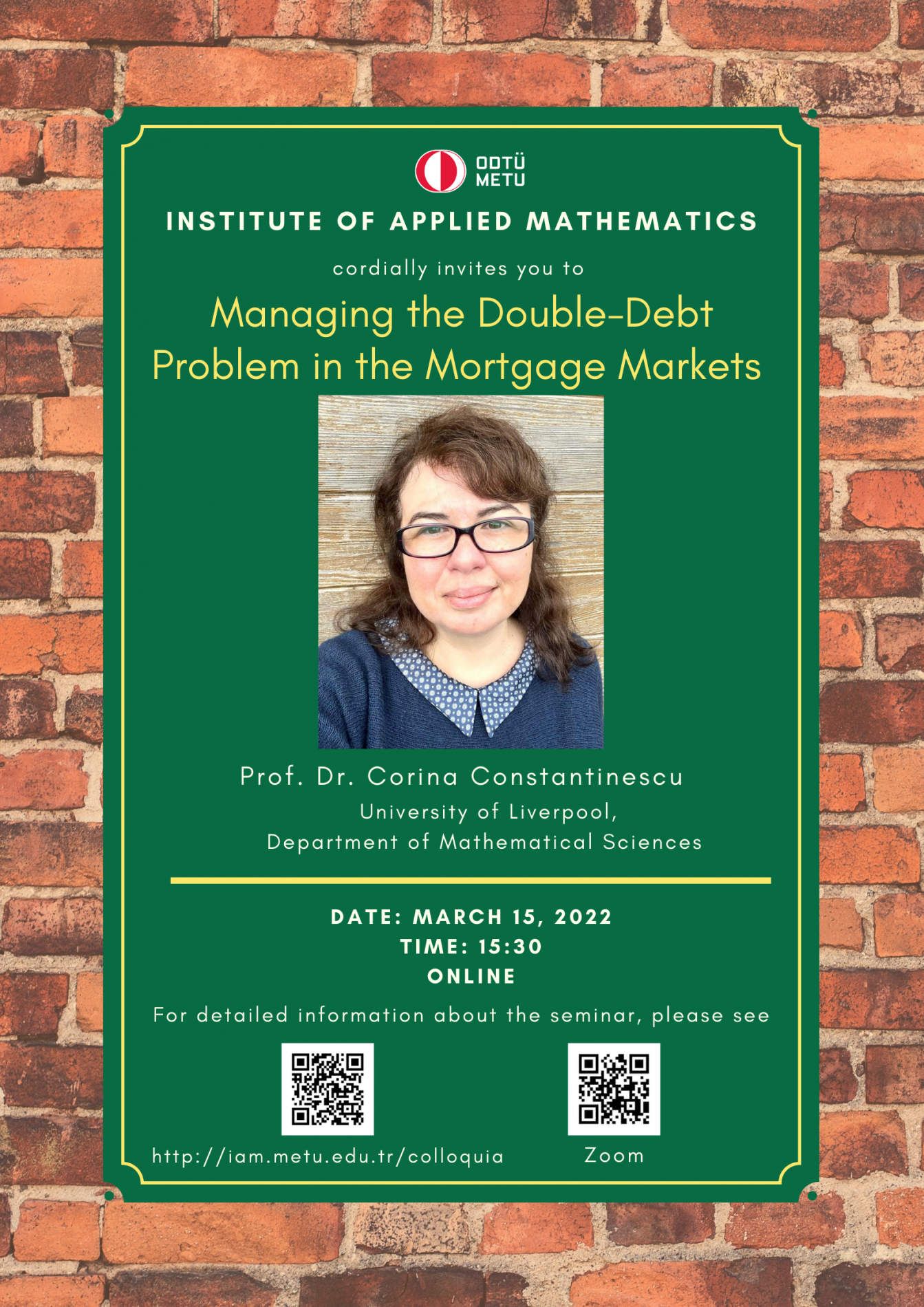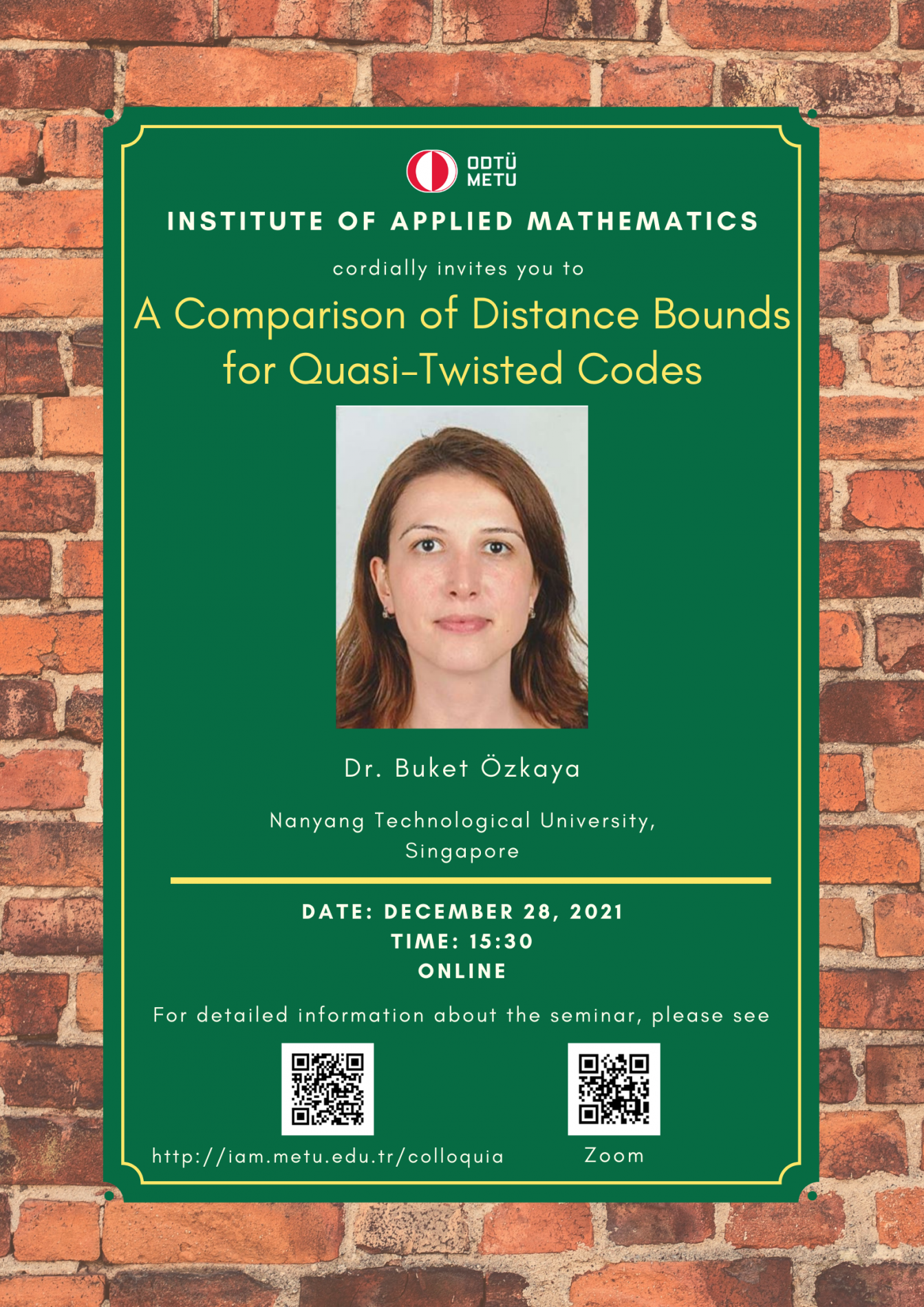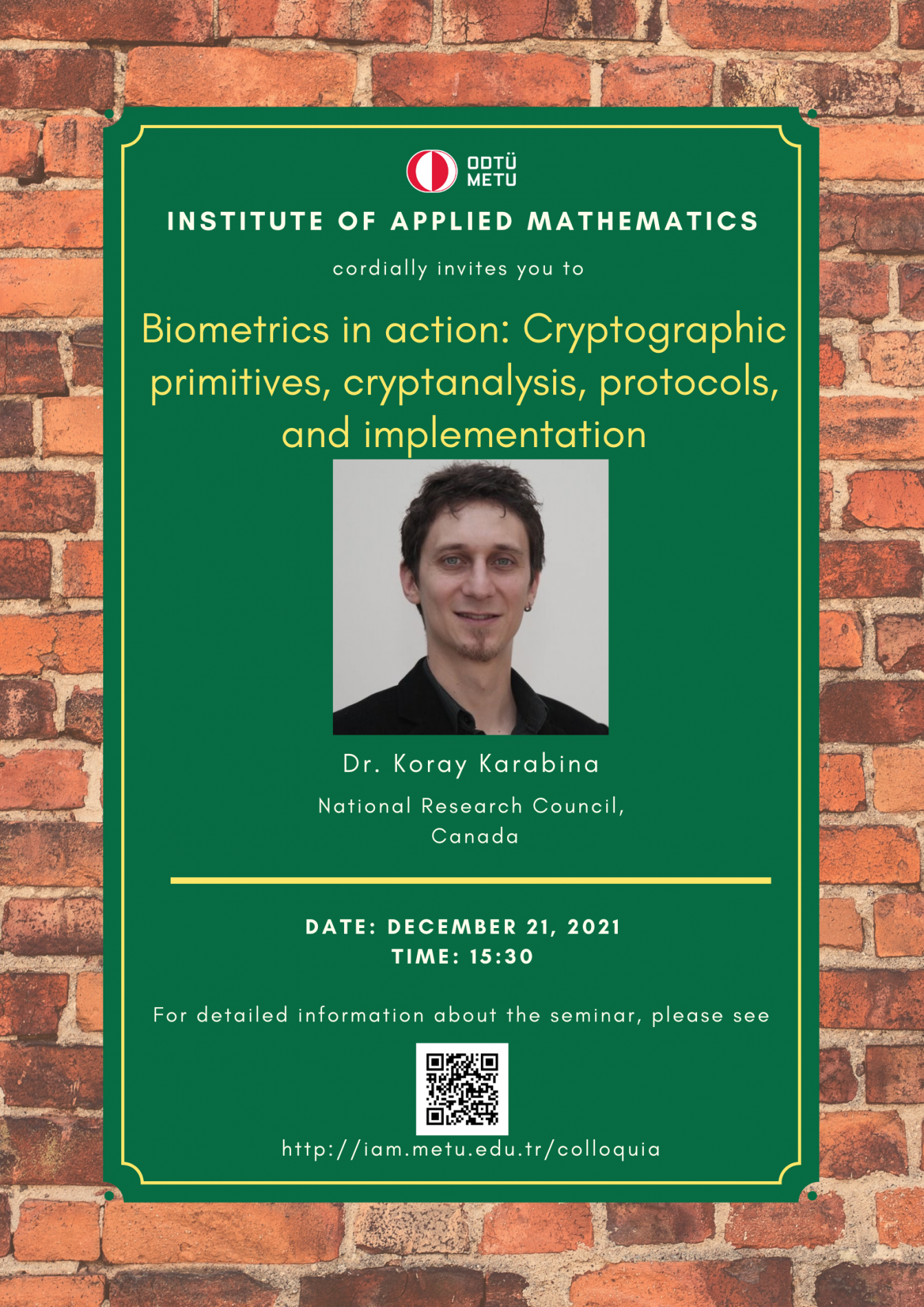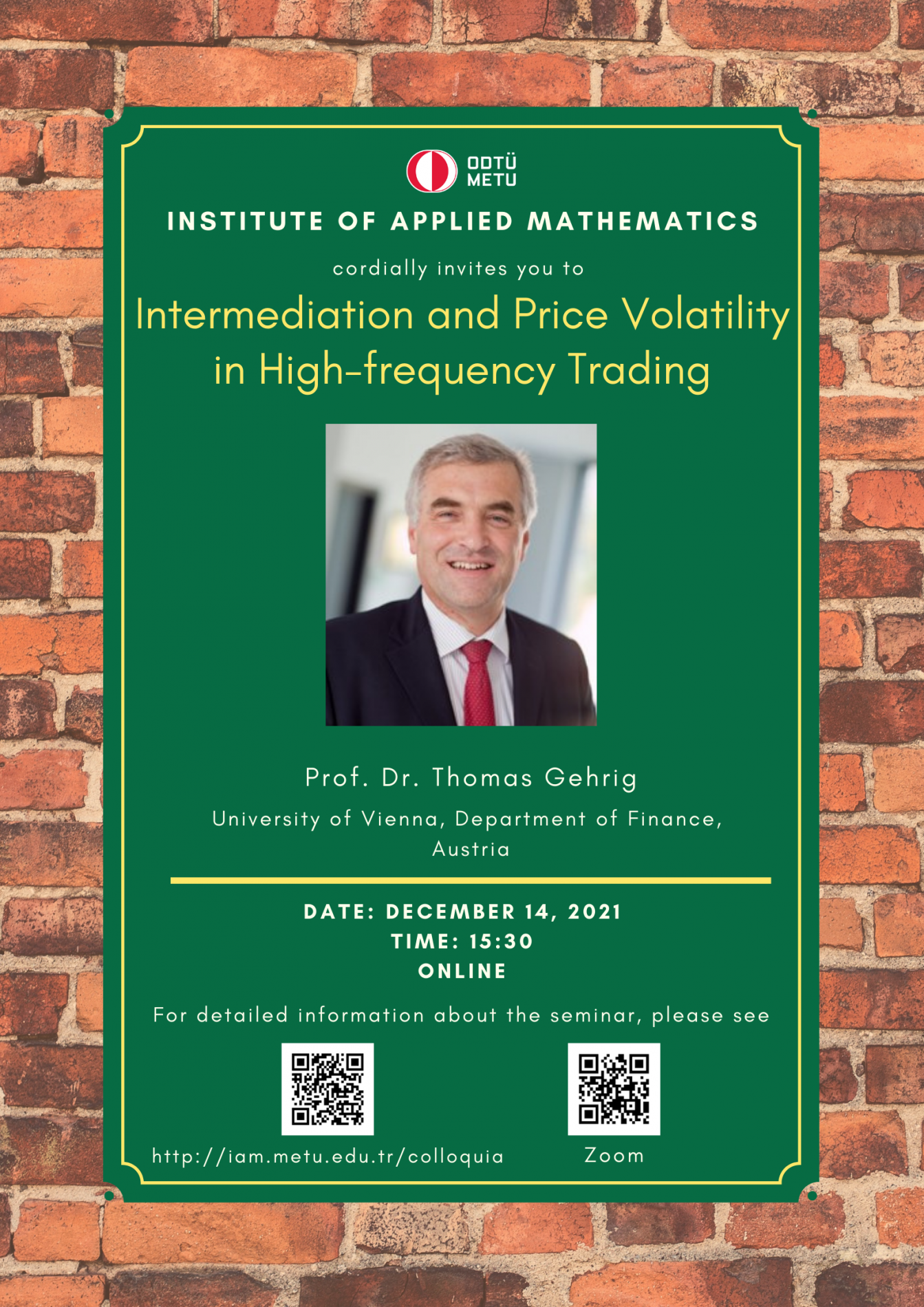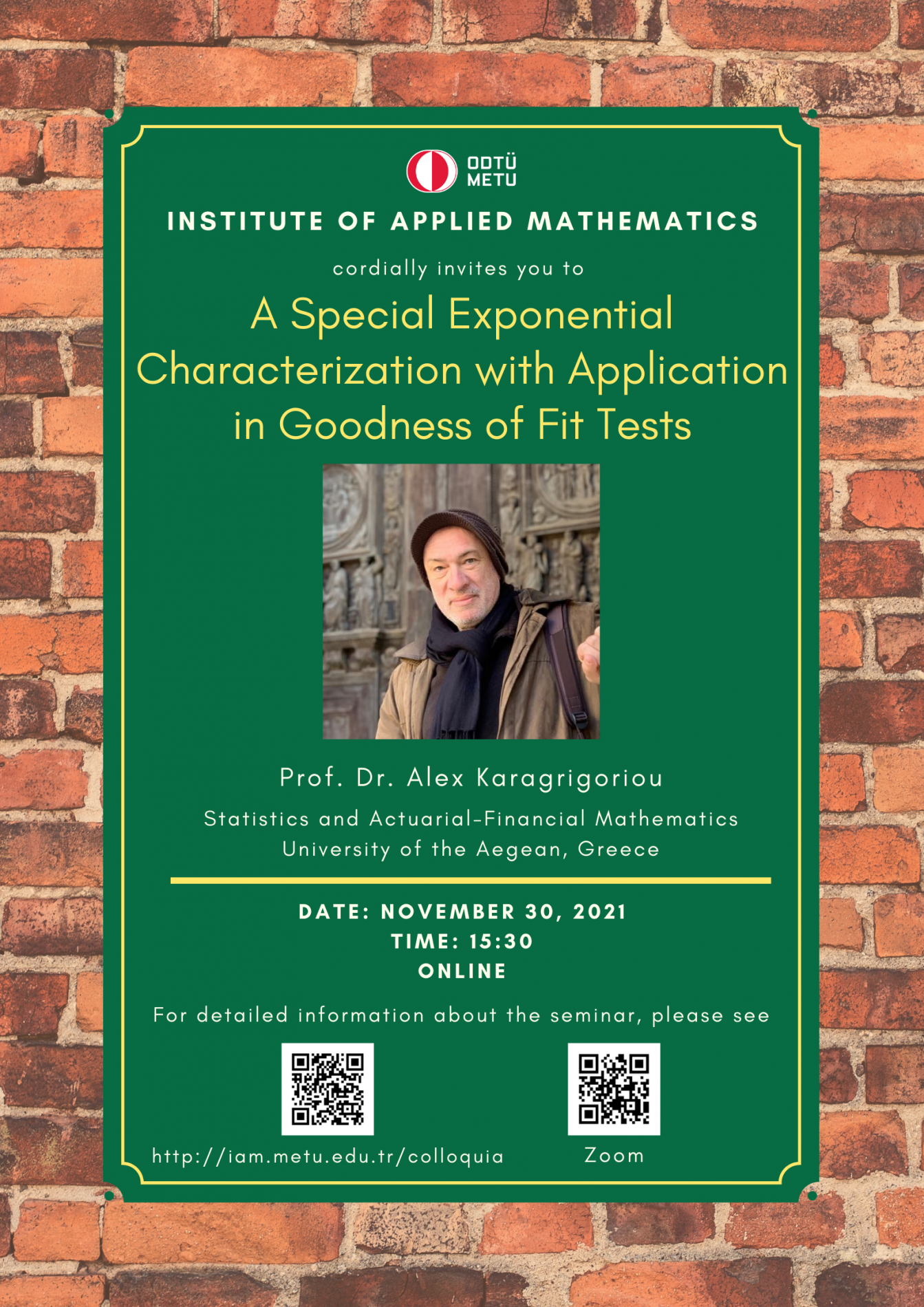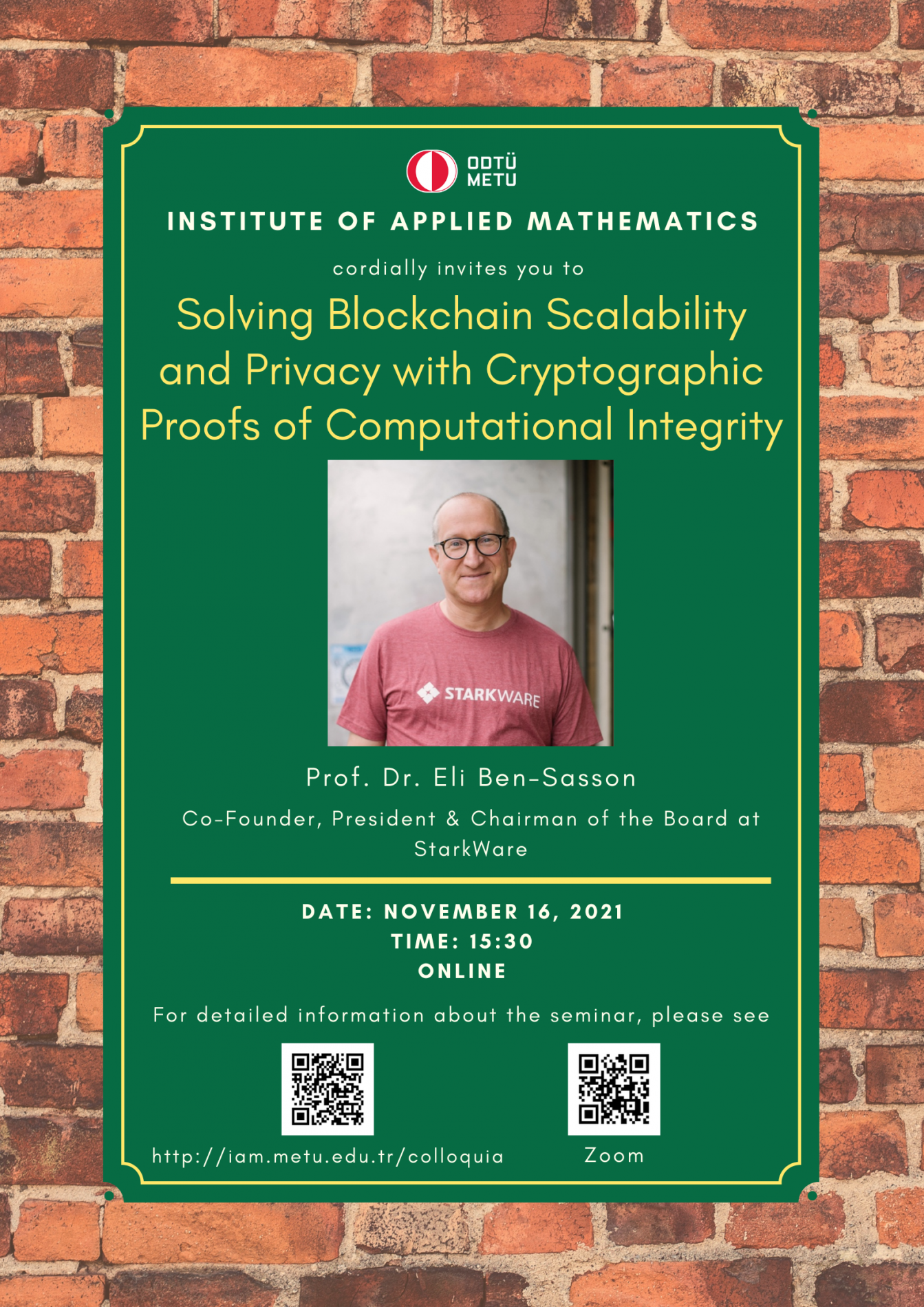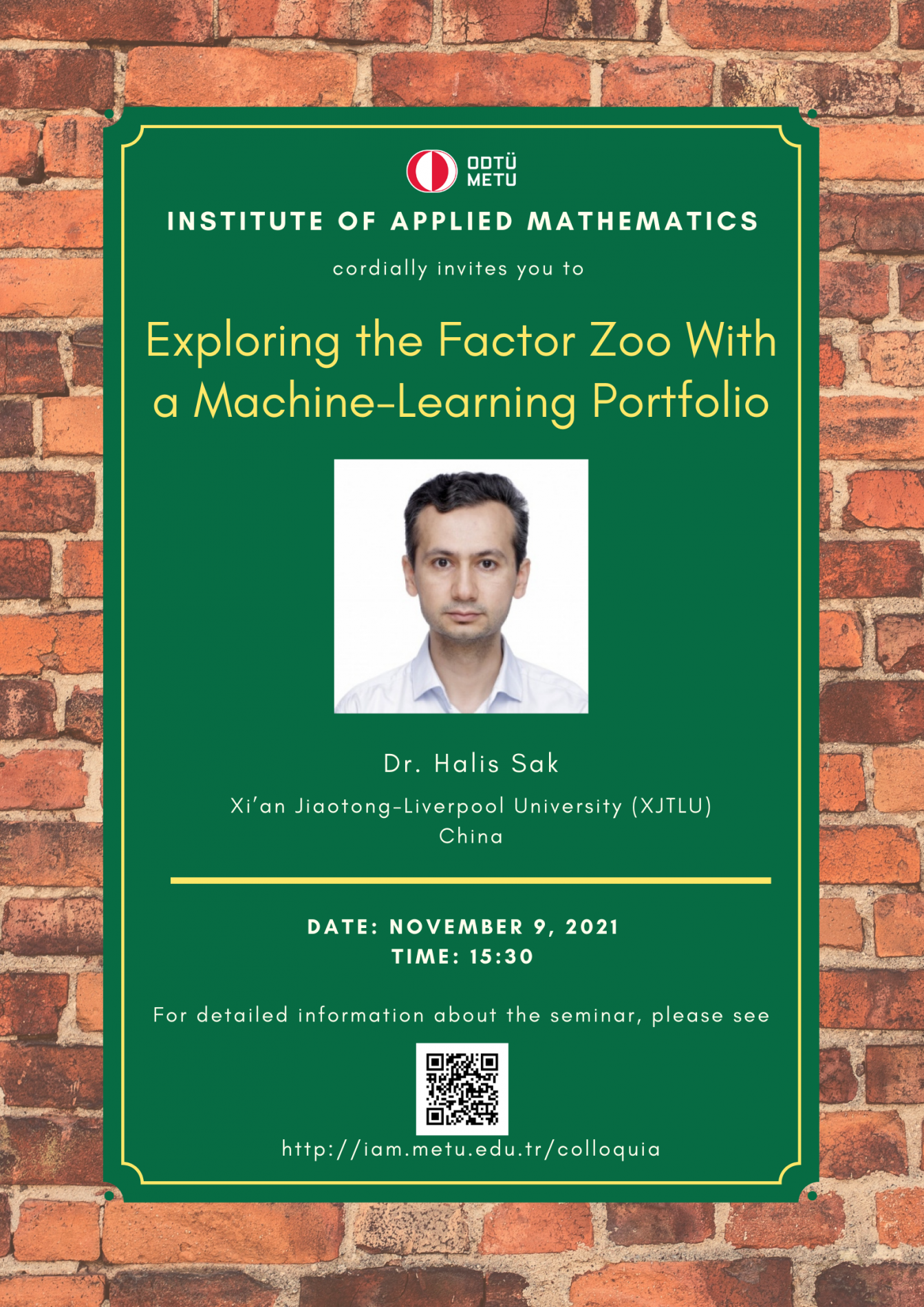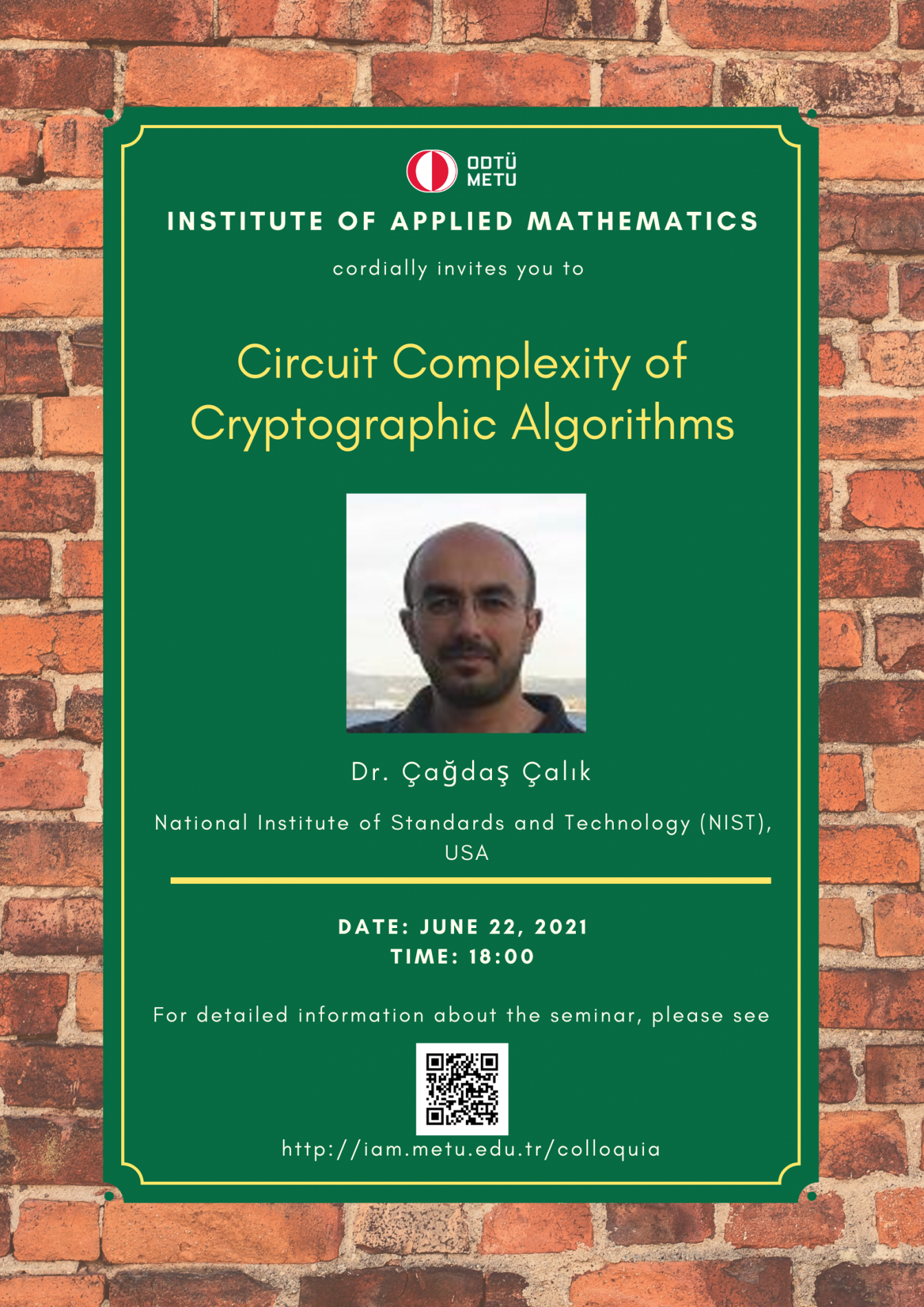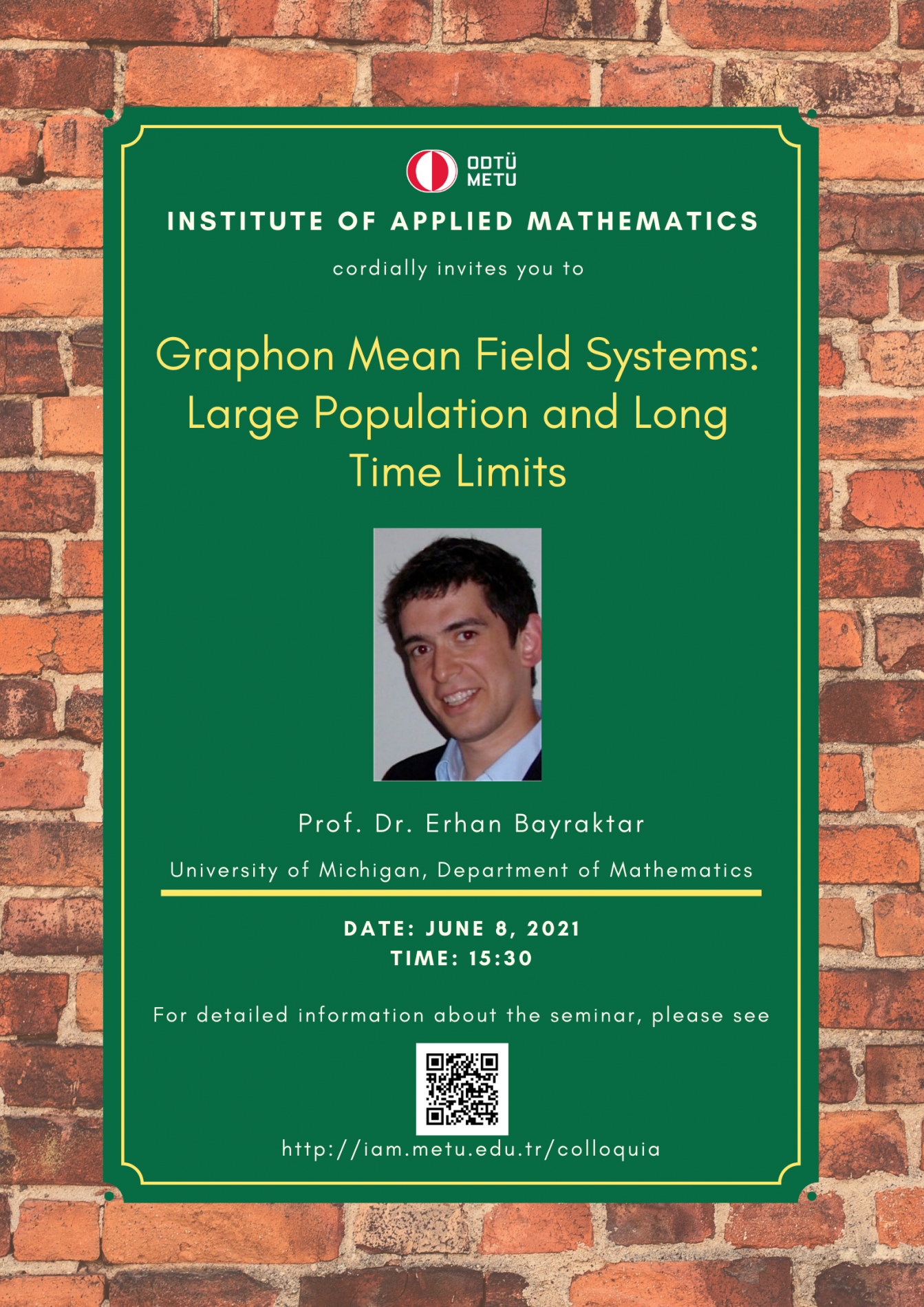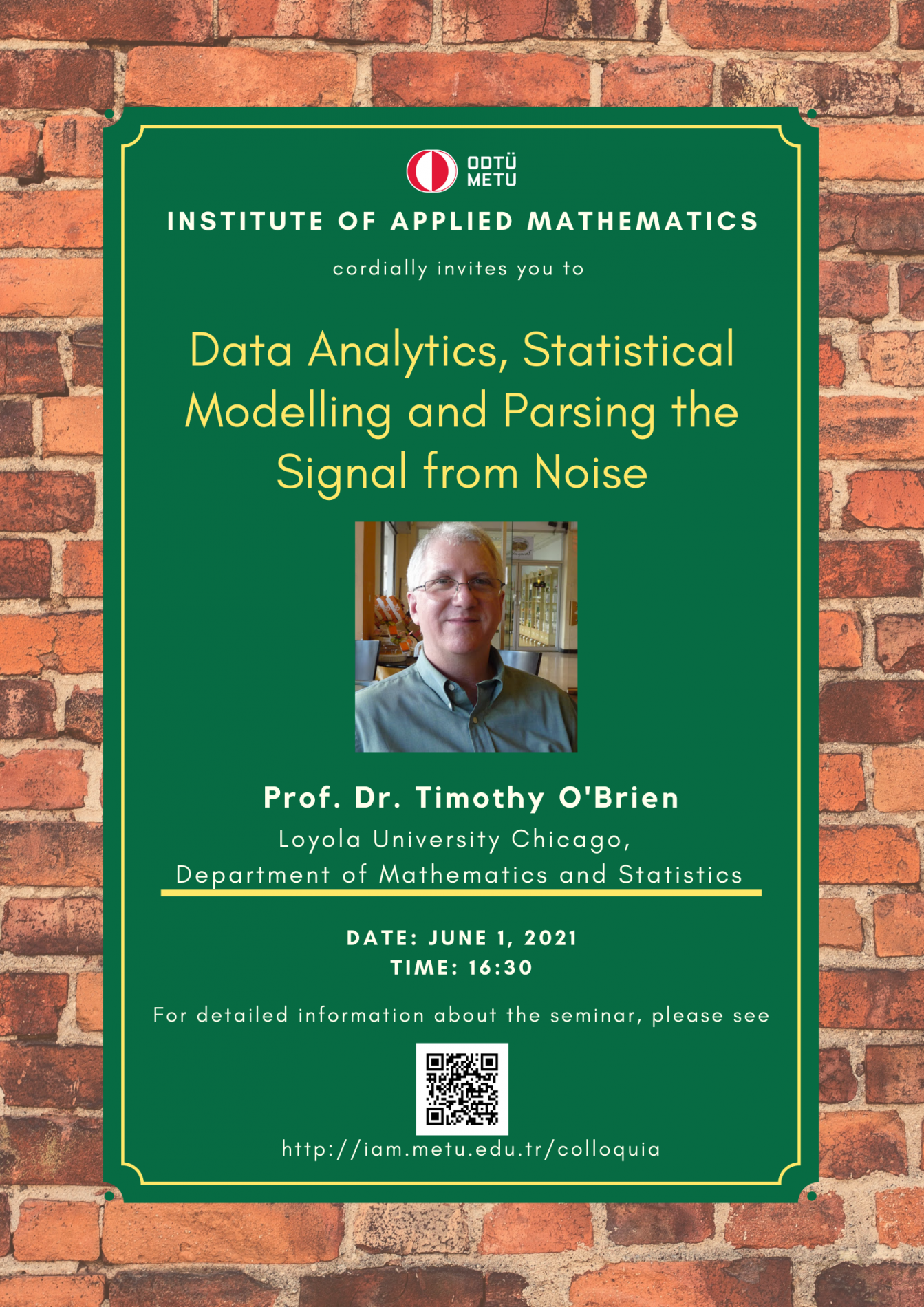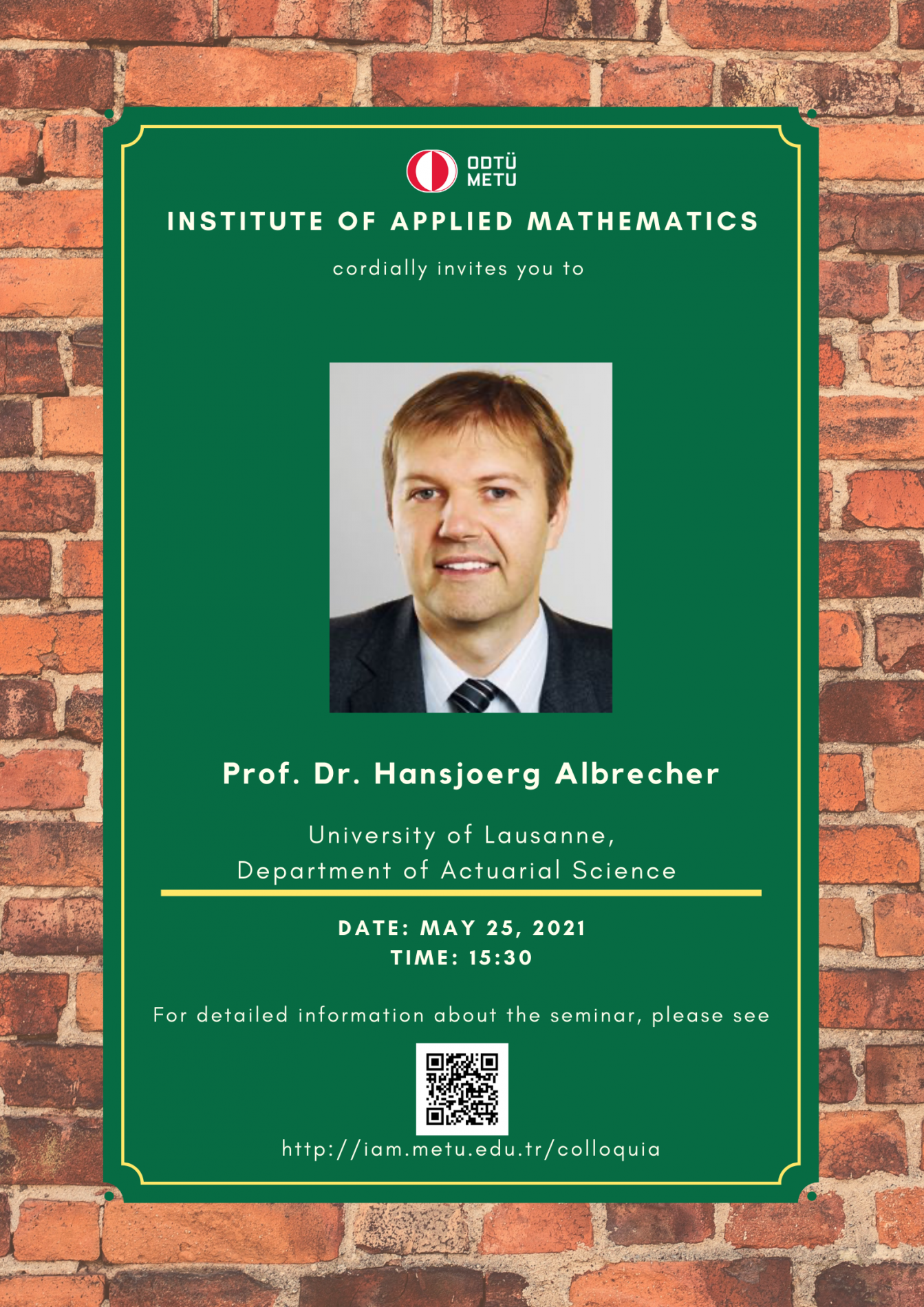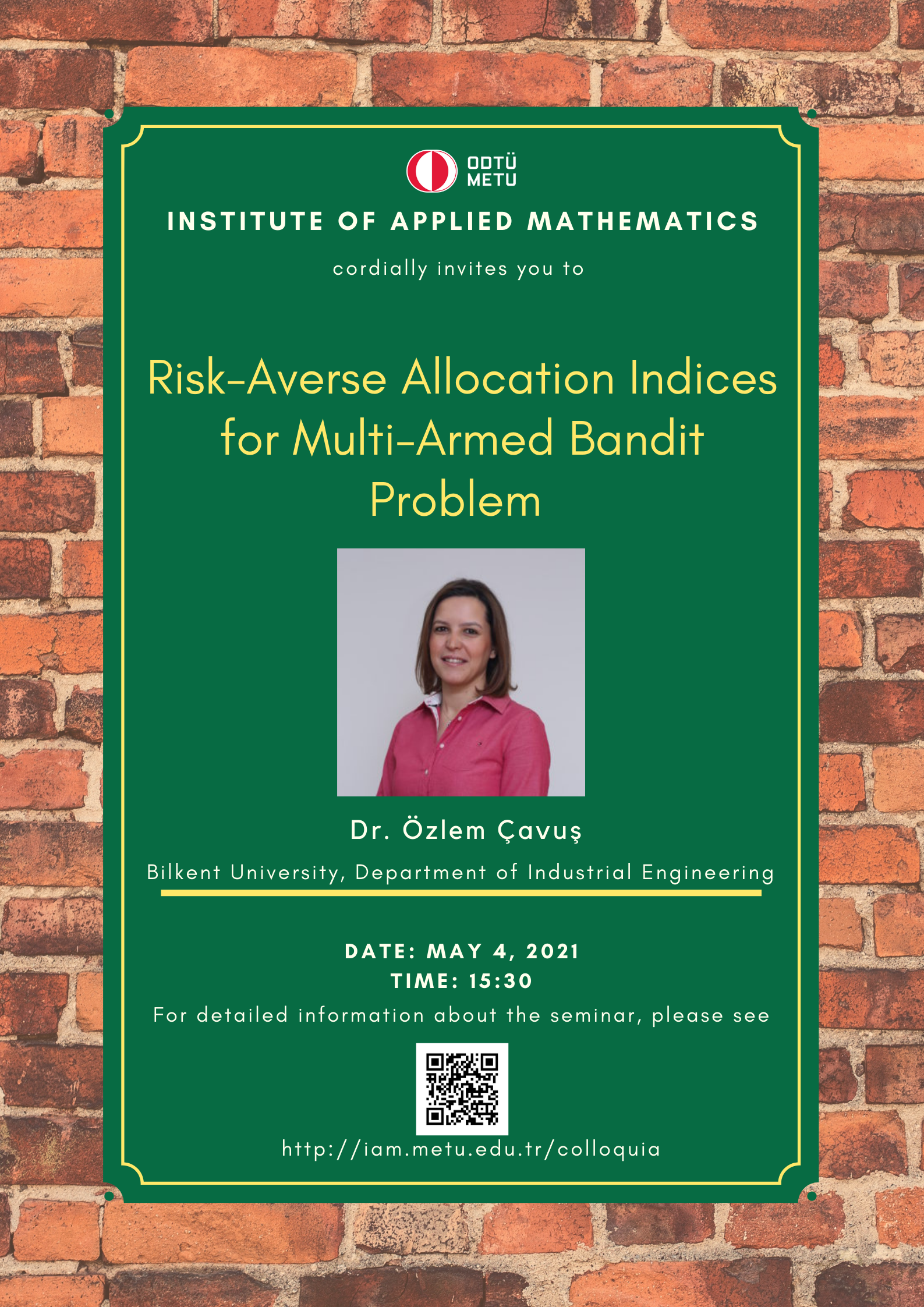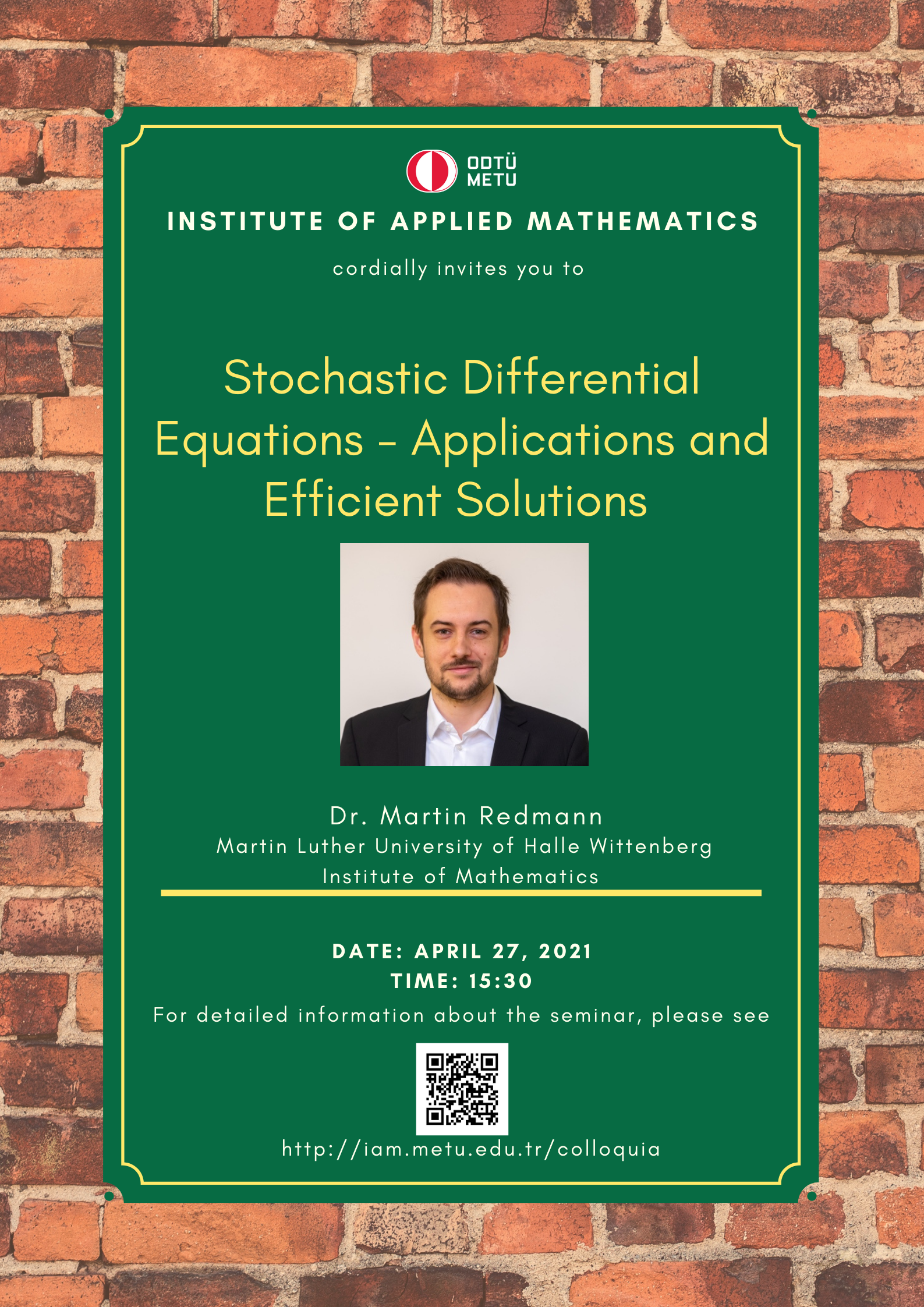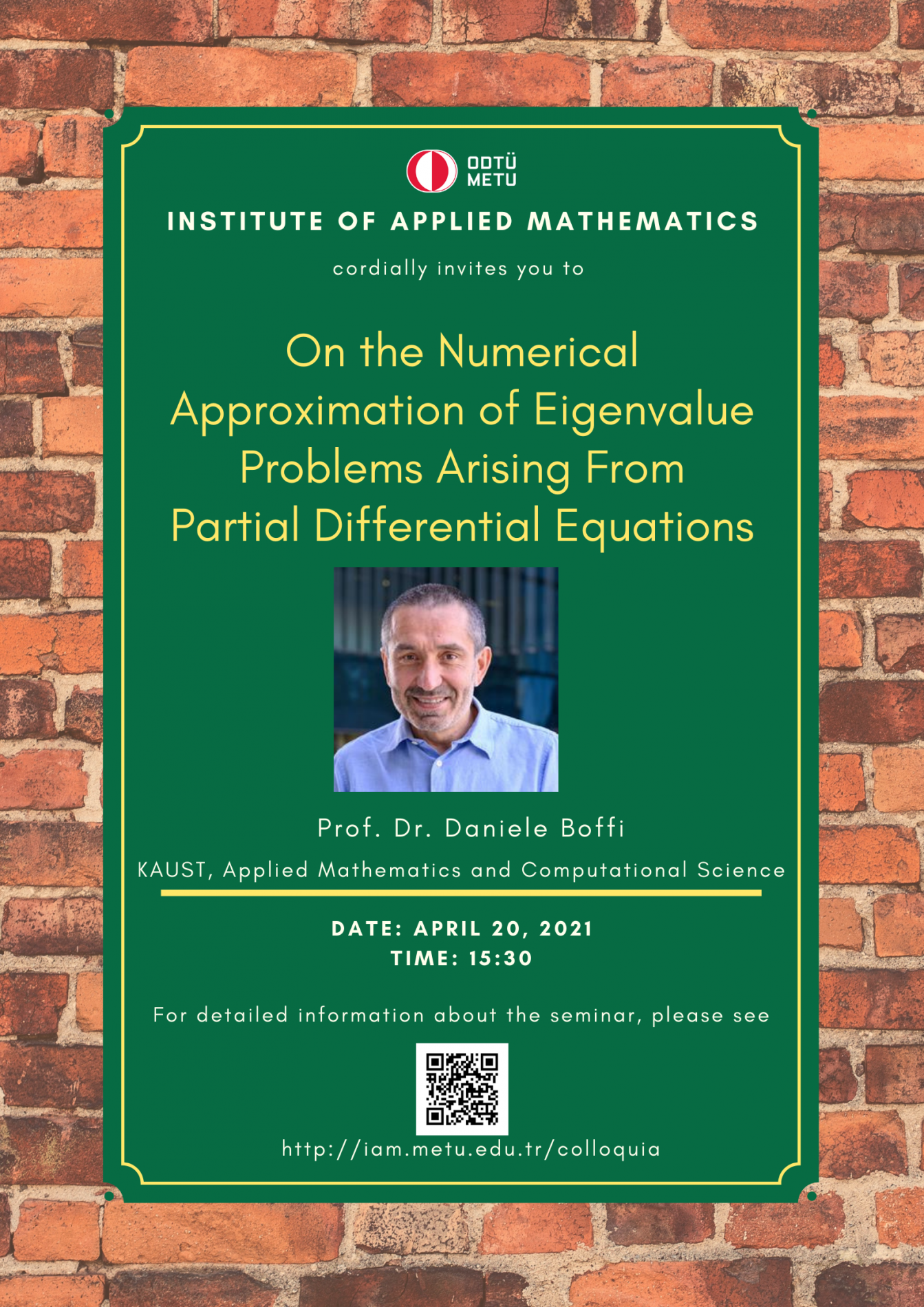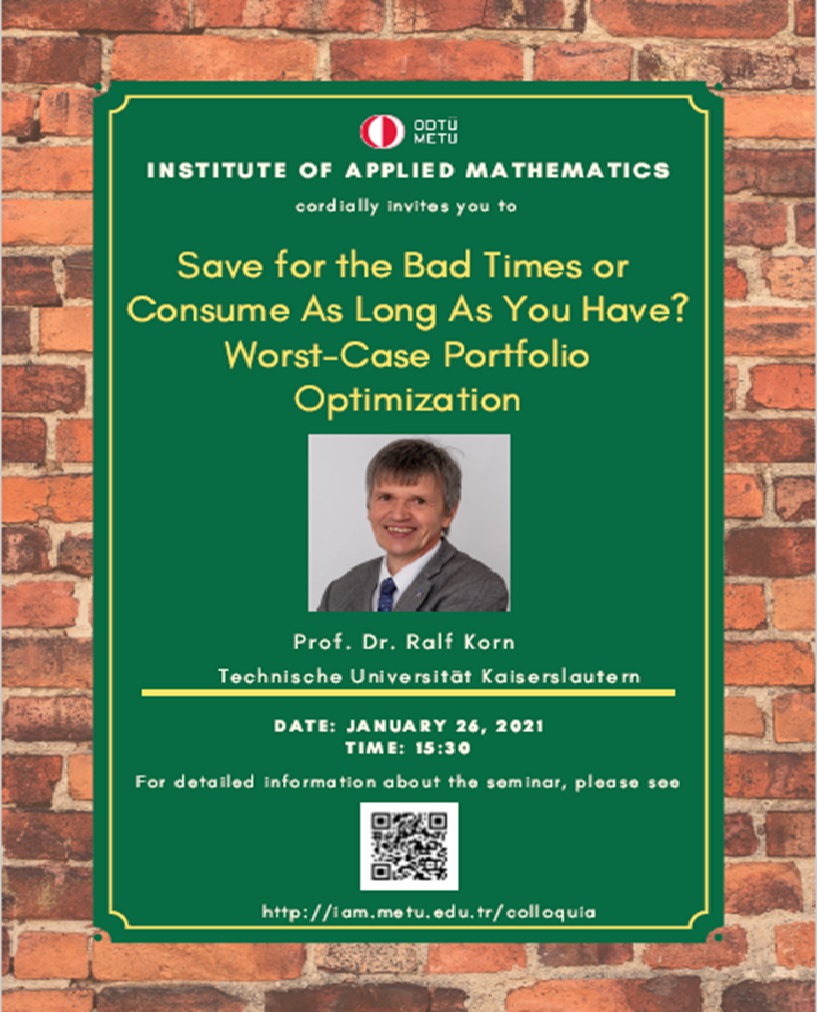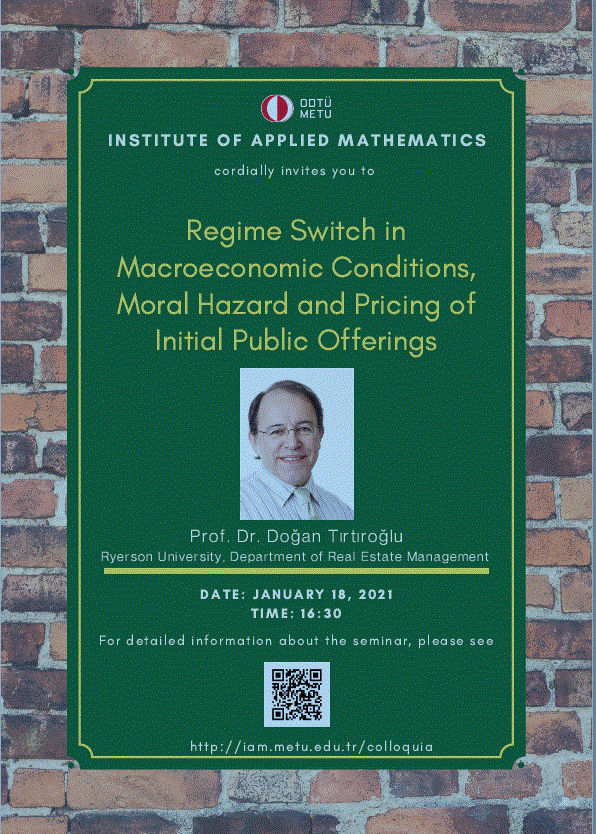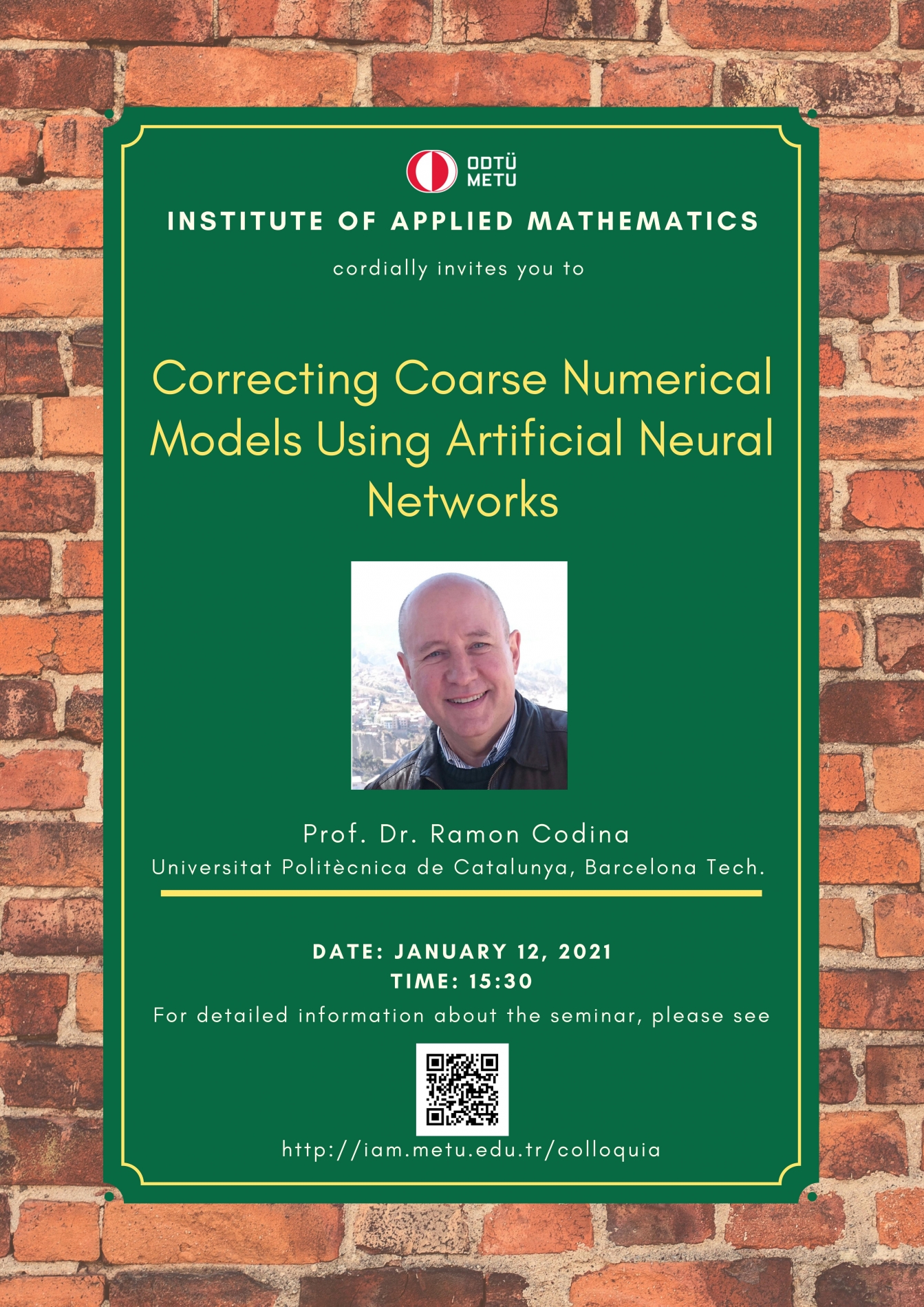Colloquia
Last Updated:
- English
- Türkçe
Departments of Statistics and Mathematics of METU and Institute of Applied Mathematics are coordinating their general seminars. Most of the weeks of the semester, Thursday afternoons, there will be a general seminar organized by one of these departments. The seminar time depends on the organizing department:
Statistics: Thursday, 14:00
IAM: Thursday, 14:30
Mathematics: Thursday, 15:40
Institute of Applied Mathematics (IAM) is an interdisciplinary centre fostering various researches and teaching activities in mathematical sciences. In order to coordinate mathematics-based research as well as to undertake collaborative research with industry, IAM has established Colloquia (General Seminars), since its foundation in 2002, almost every Tuesdays in the afternoon. A colloquium at the institute usually lasts about 45 minutes.
The Colloquium provides an opportunity to build and strengthen relations between researches, practitioners, regulators from various fields and members, especially the students, of IAM. Here, at IAM with four specialised departments (Actuarial Sciences, Cryptography, Financial Mathematics, Scientific Computing) we are expecting valuable contribution and exchange of ideas from different scholars, lecturers and specialists.
General audience of the Colloquia at IAM consists of both graduate and undergraduate students, scholars and academics from various research fields, including the departments at IAM. As the audience is not homogeneous, invited speakers are advised to consider the following general principles of a colloquium talk at IAM:
- Colloquium talks are given to general audience; however, such a colloquium talk at IAM might sometimes resemble a research seminar (only when it is necessary).
- A (colloquium) talk is not a paper, it needs a special preparation (pre-prep and pre-planning) in order to involve and attract as many attendees as possible to the subject. This is crucial if the audience is not homogeneous (with backgrounds from different research areas).
- Mathematics is an expressive and precise language we communicate; however, reading mathematics (on board or on slides) distracts and disengage the audience from the speaker! Similarly, long tables, long algorithms, crowded charts or diagrams might be difficult to read and comprehend by the audience. So, special care is needed when necessary.
- Facilities might improve the style of the talk. At IAM, besides the (white) board and transparencies, a projector connected to a computer is available for the electronic versions of the presentations.
Schedule
Affiliation: Mathematics Group, METU NCC
Speaker: Dr. Georgy Kitavtsev
Invited by:
Date/Time: 26.03.2026 - 14.30
Place: Hayri Körezlioğlu Seminar Hall, IAM/METU
|
Abstract:
|
|
Affiliation: Atilim University, Department of Mathematics
Speaker: Doç. Dr. Fatih Sulak
Invited by: Assoc.Prof.Dr. Oguz Yayla
Date/Time: 15.05.2025 - 14.30
Place: Hayri Körezlioğlu Seminar Hall, IAM/METU
|
Abstract: In this talk, we evaluate the effectiveness and limitations of the SP 800-90 entropy estimation methods by exploring the accuracy of these estimators using simulated random numbers with known entropy, investigating the correlation between entropy estimates, and studying the impacts of deterministic transformations on the estimators.
|
|
Affiliation: Department of Electrical and Electronics Engineering, METU
Speaker: Assistant Professor Ahmed Hareedy
Invited by: Assoc.Prof.Dr. Oguz Yayla
Date/Time: 24.04.2025 - 14.30
Place: Hayri Körezlioğlu Seminar Hall, IAM/METU
|
Abstract: The density of data storage devices has increased by a factor of 10,000 over the past 20 years. This progress is a result of advances in physics and architecture in conjunction with innovations in coding and signal processing. Data storage densities are expected to grow rapidly in the immediate future as applications such as Internet of Things applications access, process, and store ever-increasing amounts of data. This rapid growth results in new characteristics associated with sources of error in storage systems. In this seminar, I will present effective coding techniques that take full advantage of these new characteristics to increase the reliability of modern data storage and computing. I will introduce efficient reconfigurable constrained codes that prevent error-prone data patterns from being written, in addition to high performance low-density parity-check (LDPC) codes that correct the remaining errors in the system. I will focus on modern and next generation Flash memory devices, where this combination significantly increases the device lifetime. I will also briefly explain how this combination of coding techniques improves the performance of other physical technologies such as one-dimensional and two-dimensional magnetic recording. At a higher layer, I will present an adaptive coding solution for both centralized (managed by a single vendor) and decentralized (blockchain-based) cloud systems that offers high reliability, scalability, and flexibility. I will then discuss ideas for how machine learning and coding can help each other. First, how machine learning can help coding through directing the reconfiguration of constrained codes and guiding the design of LDPC codes. Then, how coding can help machine learning through speeding up computational storage frameworks. I will end the seminar by discussing some data processing challenges in the emerging DNA storage and quantum systems.
|
|
Affiliation: Hacettepe University, Department of Mathematics
Speaker: İsmail Aslan
Date/Time: 17.04.2025 - 14.30
Place: Hayri Körezlioğlu Seminar Hall, IAM/METU
|
Abstract: In this seminar, we will discuss artificial neural network operators that utilize sigmoidal activation functions and their applications in noise filtering (see [1]). In 1992, Cardaliaguet and Euvrard proposed a method for approximating a function using neural networks [2]. The operators obtained through this method are commonly known in the |
|
Affiliation: Department of Mathematics and Informatics, National University of Science and Technology Politehnica Bucharest, Piteşti University Center, Romania
Speaker: Loredana Bâlilescu
Date/Time: 26.09.2024 - 14.30
Place: Hayri Körezlioğlu Seminar Hall, IAM/METU
|
Abstract: In this talk, we introduce the spectral method of Bloch waves for studying the homogenization process for a second-order elliptic problem defined on a honeycomb lattice that represents the arrangement of carbon atoms in the graphene. At each edge of this lattice, we consider the one dimensional Hill’s equation. We define the Bloch waves as solution of this equation with quasi-periodic boundary conditions and we use them to establish the homogenization result by providing the spectral representation of the homogenized coefficients of a two dimensional problem. This result offers a new progress towards extending the Bloch spectral analysis to general microstructures, as well as getting new tools to understand the two dimensional behaviour of the graphene. |
Affiliation: Department of Mathematics and Informatics, National University of Science and Technology Politehnica Bucharest, Piteşti University Center, Romania
Speaker: Maria Miroiu
Date/Time: 25.09.2024 - 14.30
Place: Hayri Körezlioğlu Seminar Hall, IAM/METU
|
Abstract: This lecture presents mathematical and practical problems from engineering and sciences related to Data Analysis, Probability, Statistical Models, Root-Solving and Optimization Methods, as well as Symbolic Processing using MATLAB mathematical software. |
Affiliation: IAM/METU
Speaker: Bükre Yıldırım Külekci
Date/Time: 09.05.2024 - 14.30
Place: Hayri Körezlioğlu Seminar Hall, IAM/METU
|
Abstract: The frequency and severity of extreme events have increased in recent years in many areas. In the context of risk management for insurance companies, reinsurance provides a safe solution as it offers coverage for large claims. This paper investigates the impact of dependent extreme losses on ruin probabilities under four types of reinsurance: excess of loss, quota share, largest claims, and ecomor. To achieve this, we employ the dynamic GARCH-EVT-Copula combined model to fit the specific features of claim data and provide more accurate estimates compared to classical models. We derive the surplus processes and asymptotic ruin probabilities under the Cramer-Lundberg risk process. Using a numerical example with real-life data, we illustrate the effects of dependence and the behavior of reinsurance strategies for both insurers and reinsurers. This comparison includes risk premiums, surplus processes, risk measures, and ruin probabilities. The findings show that the GARCH-EVT-Copula model mitigates the over- and under-estimation of risk associated with extremes and lowers the ruin probability for heavy-tailed distributions. |
|
Affiliation: Nazarbayev University, Kazakhstan
Date/Time: 25.04.2024 - 16.00
Place: Online
|
Abstract: A new operator for handling the joint risk of different sources has been presented and its various properties are investigated. The problem of risk evaluation of multivariate risk sources has been studied, and a multivariate risk measure, so-called multivariate average-value-at-risk, mAVaRα, is proposed to quantify the total risk. It is shown that the proposed operator satisfies the four axioms of a coherent risk measure while reducing to one variable average-value-at-risk, AVaRα, in case N = 1. In that respect, it is shown that mAVaRα is the natural extension of AVaRα to the N-dimensional case maintaining its axiomatic properties. The framework is applicable for Gaussian mixture models with dependent risk factors that are naturally used in financial and actuarial modelling. Examples with numerical simulations are also illustrated throughout. |
|
Affiliation:
Date/Time: 04.04.2024 - 14.30
Place: Hayri Körezlioğlu Seminar Hall, IAM/METU
|
Abstract: Rapidly evolving high performance computing resources result in an exponential increase in data storage demands. Scientific data compression is a much cheaper alternative to constantly expanding data storage units. However, due to the nature of current floating point representations and scientific simulations, lossless compression is rarely relevant. Lossy compression offers a viable alternative, however there are two main challenges, namely hesitancy of applications scientists and seemingly low compression ratios. We present our approach to tackling these two problems. Our approach involves compressing the data so that a prescribed loss is guaranteed, not on the original data, but on the quantities of interest which are computed from the data. Advantages of this approach are twofold, preserving quantities of interest results in better compression, and assures the user that compression artifacts will not adversely affect their analysis. We present our mathematical framework, and our compression tool/library MGARD (MultiGrid Adaptive Reduction of Data) which was developed for CODAR (Co-design Center for Online Data Analysis and Reduction at the Exascale). We provide illustrative examples from experimental and computational data. |
|
Affiliation: Department of Mathematics, Technische Universität Chemnitz
Date/Time: 07.03.2024 - 14.30
Place: Hayri Körezlioğlu Seminar Hall, IAM/METU
|
Abstract: We study an optimization problem for pedestrian dynamics aiming at a fast evacuation of a crowd in case of an emergency situation. The forward model, the so-called Hughes model, consists of a nonlinear transport equation describing the motion of the pedestrians, coupled with an Eikonal equation whose solution provides the direction towards the next emergency exit. For an optimization of that process we add agents which are individuals of the crowds as well, but have the ability to locally attract other pedestrians. By optimizing their trajectory and attraction intensity one can avoiding e.g. the case that too many pedestrians want to squeeze through the same exit whereas other exits are rarely used, so that the evacuation might be much faster. We provide existence results and necessary optimality conditions for the resulting optimal control problem and present gradient-based optimization algorithms for a numerical computation. For the spatial discretization of the transport equation we use a finite volume scheme and show that important properties like mass-conservation and preservation of the natural bounds imposed on the pedestrian density function are retained. Furthermore, we show in numerical experiments that this optimization technique indeed leads to an improvement of an evacuation. |
|
Affiliation: Department of Industrial Engineering, Middle East Technical University
Date/Time: 12.12.2023 - 15.40
Place: Hayri Körezlioğlu Seminar Hall, IAM/METU
|
Abstract: The hub location problem (HLP) is a fundamental facility planning problem with various applications in transportation, logistics, and telecommunication systems. Due to strategic nature of the HLP, considering uncertainty and the associated risks is of high practical importance in designing hub networks. In this talk a risk-averse single allocation HLP, where the traffic volume between the origin–destination (OD) pairs is considered to be uncertain, is addressed. The uncertainty in demands is captured by a finite set of scenarios and the problem is cast as a risk-averse two-stage stochastic problem using mean-CVaR as the risk measure, and a novel solution approach combining Benders decomposition is proposed. Using Australian Post data, a set of computational experiments is conducted to study the effect of different input parameters on the optimal solution, and to evaluate the performance of the proposed solution algorithm. Managerial insights are derived and presented based on the obtained results. |
|
- November 21, 2023: İsmail Güzel,CROCKER Plots: A Visual Topological Exploration of Dynamical Systems
Affiliation: Senior Researcher, TÜBİTAK ULAKBİM
Date/Time: 21.11.2023 - 15.40
Place: Hayri Körezlioğlu Seminar Hall, IAM/METU
|
Abstract: |
|
Affiliation: Department of Mathematics, Atılım University
Date/Time: 17.10.2023 - 16.00
Place: Hayri Körezlioğlu Seminar Hall, IAM/METU
|
Abstract: The zeta function of a curve C defined over a finite field Fq is the formal power series exp(\sum_{n=1}^\infty{#C(F_{q^n})T^n/n}. It is known that the zeta function is a rational function, with only the numerator depending on C. The numerator is called the L-polynomial of C, and is therefore equivalent to knowledge of the number of points #C(Fq^n ) on the curve over all extensions of Fq . In general, the L-polynomial of a curve of genus g is determined by g coefficients. We show that the L-polynomial of a supersingular curve of genus g is determined by fewer than g coefficients. We characterize which coefficients are needed. |
|
Affiliation: IBM Research Europe
Invited by:
Zoom: IAM COLLOQUIUM
Zoom Meeting ID: https://zoom.us/j/92462211844?pwd=OWJwWWlscmVZNWt3MlFId3p1NTVZQT09
Date/Time: 20.06.2023 - 15.30
|
Abstract: SQIsign is a very compact signature scheme based on isogenies of supersingular elliptic curves. In this talk, I will present the theory behind SQIsign, and the necessary steps to give a complete and efficient implementation from top to bottom. |
|
Affiliation: CRETC. Competition & Regulation Economics Testimony and Consulting LLC
Invited by: Prof. Dr. A. Sevtap Selçuk Kestel
Zoom: IAM COLLOQUIUM
Zoom Meeting ID: https://zoom.us/j/92462211844?pwd=OWJwWWlscmVZNWt3MlFId3p1NTVZQT09
Date/Time: 13.06.2023 - 15.30
|
Abstract: Customary event studies of financial market data implicitly assume that the probability of an event increases linearly from zero to one over the event window. If the true probability behaves differently, the study might attribute the observed outcome to the market not being efficient, investors not acting rationally, or to the effect of some unobserved variable. Mergers and acquisitions between pairs of firms that are publicly traded make up an important set of events that can provide insight on these and related issues. |
|
***Yarın yapılması planlanan seminer konuşmacının rahatsızlığı nedeniyle iptal edilmiştir.
Affiliation: Boğaziçi Üniversitesi, Matematik Bölümü
Invited by: Sevtap Kestel
Zoom: IAM COLLOQUIUM
Zoom Meeting ID: https://zoom.us/j/92462211844?pwd=OWJwWWlscmVZNWt3MlFId3p1NTVZQT09
Date/Time: 06.06.2023 - 15.30
|
Abstract: The talk will begin with a brief overview of Stein's method and certain random permutation/word statistics. Then we will discuss results and open questions on the longest common subsequence problem, which is a classical similarity measure for discrete sequences. Some notes on the well-known increasing subsequence and relatively less-known alternating subsequence problems will be included. The talk will be concluded with discussions on the use of similarity measures in time series analysis. |
|
Affiliation: Monash University
Invited by: Assoc. Prof. Dr. Oğuz YAYLA
Zoom: IAM COLLOQUIUM
Zoom Meeting ID: https://zoom.us/j/92462211844?pwd=OWJwWWlscmVZNWt3MlFId3p1NTVZQT09
Date/Time: 30.05.2023 - 14.00
|
Abstract: Verifiable Random Functions (VRFs) are important cryptographic tools used to supply (secret-dependent) random values in a verifiable fashion to higher level cryptographic protocols. They are, for example, employed in (particularly, Proof-of-Stake based) blockchain protocols such as Algorand, Cardano and Dfinity. A (quantum-insecure) VRF proposal has also recently been deployed at WhatsApp. This talk will cover a series of recent advances in constructing practical VRFs based on post-quantum security assumptions, particularly based on lattices and hash functions. In particular, the talk will argue that it is possible to construct significantly more efficient solutions for blockchain by studying the required functionalities more carefully. |
|
Affiliation: Atılım University-Department of Mathematics
Invited by: Buket Özkaya
Zoom: IAM COLLOQUIUM
Zoom Meeting ID: https://zoom.us/j/92462211844?pwd=OWJwWWlscmVZNWt3MlFId3p1NTVZQT09
Date/Time: 09.05.2023 - 15.30
|
Abstract: Let Fq be a finite field with q elements, where q is a power of a prime. A polynomial g(x) ∈ Fq[x] is called a permutation polynomial (PP) over Fq whenever the associated function g : a→ g(a) is a permu- tation of Fq. Recently there has been a great interest in permutation polynomials with a few terms because of their simple algebraic struc- tures and extraordinary properties. Permutation polynomials are also very important since there are many applications of them in areas such as cryptography, coding theory and combinatorial designs. As far as we know, the studies on permutation polynomials goes back to work done by Dickson and Hermite. In this talk we will try to give our recent results on permutation polynomials over finite fields.
|
|
Affiliation: NIST (National Institute of Standards and Technology)
Invited by: Oğuz Yayla
Zoom: IAM COLLOQUIUM
Zoom Meeting ID: https://zoom.us/j/92462211844?pwd=OWJwWWlscmVZNWt3MlFId3p1NTVZQT09
Date/Time: 02.05.2023 - 15.30
|
Abstract: This talk includes an overview of the NIST Lightweight Cryptography Standardization process and explains the evaluation of the finalists, the selection of Ascon as the winner and the final steps in the standardization process. |
|
Affiliation: Industrial Engineering - Çankaya University
Invited by: Prof. Dr. Sevtap Kestel
Zoom: IAM COLLOQUIUM
Zoom Meeting ID: https://zoom.us/j/92462211844?pwd=OWJwWWlscmVZNWt3MlFId3p1NTVZQT09
Date/Time: 18.04.2023 - 15.30
|
Abstract: In the event of disruptions in a transportation network following a disaster, humanitarian organizations find it challenging to provide basic requirements for beneficiaries. Demand may be met using intermodal transportation as an alternative when the unimodal transportation infrastructure is damaged. This study proposes a mathematical model for utilizing intermodal transportation using 40 ft standard containers while delivering relief supplies by road, rail, and sea modes. |
|
Affiliation: Innopolis University, Center for Technologies in Robotics and Mechatronics Components
Invited by: Assoc. Prof. Dr. Hamdullah Yücel – Erasmus Visitor
Place : Hayri Körezlioğlu Seminar Hall, IAM, METU
Zoom: IAM COLLOQUIUM
Zoom Meeting ID: https://zoom.us/j/92462211844?pwd=OWJwWWlscmVZNWt3MlFId3p1NTVZQT09
Date/Time: 28.02.2023 - 15.30
|
Abstract: Models with explicit constraints represent a broad class of systems; in robotics a notable example is walking robots. Controlling such systems with traditional control methods requires a transformation of the model. Orthogonal decomposition-based transformations had been developed and used in walking robotics for solving a number of control problems, from inverse dynamics to linear quadratic regulation and observer design. In this talk we explore the assumptions behind orthogonal decomposition methods, learn how the model transformation is applied and highlight limitations of the existing approaches. |
|
Affiliation: Department of Statistics and Actuarial - Financial Mathematics, University of the Aegean, Karlovassi, GR-83 200 Samos, Greece
Speaker: Dimitrios Konstantinides
Place : Hayri Körezlioğlu Seminar Hall, IAM, METU
Zoom: IAM COLLOQUIUM
Zoom Meeting ID: https://zoom.us/j/92462211844?pwd=OWJwWWlscmVZNWt3MlFId3p1NTVZQT09
Date/Time: 21.02.2023 - 15.30
|
Abstract: In this paper we consider the stability property of the class of generalized subexponential distributions with respect to product-convolution. Assuming that the primary distribution is in the class of generalized subexponential distributions, we find conditions for the second distribution in order that their product-convolution belongs to the class of generalized subexponential distributions as well. The similar problem for the class of generalized subexponential positively decreasing-tailed distributions is considered. |
|
Affiliation: International Centre for Theory of Quantum Technologies (ICTQT)
University of Gdansk, Poland
Place : Hayri Körezlioğlu Seminar Hall, IAM, METU
Zoom: IAM COLLOQUIUM
Zoom Meeting ID: https://zoom.us/j/92462211844?pwd=OWJwWWlscmVZNWt3MlFId3p1NTVZQT09
Date/Time: 02.02.2023 - 15.30
|
Abstract: The talk will give a brief introduction to the basic principles of quantum error correction. In general, a quantum error-correcting code is a subspace of a complex Hilbert space that allows to protect quantum information against certain errors. After a short introduction to the relevant concepts of quantum mechanics, connections between quantum error-correcting codes (QECCs) and algebraic coding theory will be discussed. Using the so-called stabiliser formalism, we illustrate how QECCs can be constructed using techniques from algebraic coding theory. |
|
Affiliation:
Speaker: Prof. Dr. Gerhard-Wilhelm Weber
Invited by:
Place:
Zoom:
Zoom Meeting ID: https://zoom.us/j/92462211844?pwd=OWJwWWlscmVZNWt3MlFId3p1NTVZQT09
Passcode:
Date/Time: 27.12.2022 - 15.30
|
Abstract: To be announced later |
|
Affiliation: Department Of Mechanical Engineering/METU
Speaker: Prof. Dr. Ender Ciğeroğlu
Invited by: Önder Türk
Place:
Zoom:
Zoom Meeting ID: https://zoom.us/j/92462211844?pwd=OWJwWWlscmVZNWt3MlFId3p1NTVZQT09
Passcode:
Date/Time: 20.12.2022 - 15.30
|
Abstract: Linear models are commonly used for the modeling of engineering structures. However, all engineering structures shows nonlinear behavior and these behaviors become more important in nowadays due to the increasing demand for light designs. In addition to this, in the last decades, nonlinearities are included in structures in order to improve their dynamic behavior. Therefore, periodic forced response prediction of such systems gives unvaluable information about how such systems can be designed. In this talk, approaches used for the determination of periodic forced vibration of such systems are discussed, where special emphasis is given on the numerical methods used for the analysis of such systems. |
|
Affiliation: CNRS, Aix-Marseille University, Centrale Marseille, Marseilles, France
Speaker: Prof. Dr. Patrick Sole
Invited by: Dr. Buket Özkaya
Place: Online
Zoom: IAM COLLOQUIUM
Zoom Meeting ID: https://zoom.us/j/92462211844?pwd=OWJwWWlscmVZNWt3MlFId3p1NTVZQT09
Passcode:
Date/Time: 22.11.2022 - 15.30
|
Abstract: There are exactly 11 rings of order 4, four of which are unital by Rhagavandran (1969) Among the remaining seven we select three as alphabets for our codes: E,I, H. We study |
|
Affiliation: Atılım University, Department of Industrial Engineering
Speaker: Prof. Dr. Serkan Eryılmaz
Invited by: A. Sevtap Kestel
Place: Hayri Körezlioğlu Seminar Hall, IAM, METU
Zoom: IAM COLLOQUIUM
Zoom Meeting ID: https://zoom.us/j/92462211844?pwd=dUhuUU5wc0FLMDgxbUV5ZW9IMktGUT09
Passcode:
Date/Time: 15.11.2022 - 15.30
|
Abstract: In many reliability based models, the lifetimes of units or components are measured in terms of the number of cycles. For example, the lifetimes of batteries may be measured in terms of how many times their charge-discharge processes have been repeated. In this case, a cycle is one complete use of the battery to store power and release it.According to the discrete time age replacement policy, a system whose lifetime is measured by the number cycles is replaced preventively after a specified number of cycles or correctively at failure, whichever occurs first. In this talk, discrete time age replacement policies will be considered for both single unit and parallel systems. In particular, the necessary conditions for the unique and finite replacement cycle which minimizes the expected cost per unit of time will be presented. |
|
Affiliation: Universidad del Bio-Bio
Invited by: Önder Türk
Place: Online
Zoom: IAM COLLOQUIUM
Zoom Meeting ID: https://zoom.us/j/92462211844?pwd=OWJwWWlscmVZNWt3MlFId3p1NTVZQT09
Passcode:
Date/Time: 25.10.2022 - 15.30-16:30
|
Abstract: In this talk we present mixed formulations for eigenvalue problem in two and three dimensions. More precisely, for the Stokes and linear elasticity eigenproblems. With the aid of suitable finite element spaces, we prove that the proposed methods are convergent and spurious free. We also present a piori error estimates for the eigenfunctions and eigenvalues. Also, we perform a posteriori error analysis for the presented mixed finite element discretizations, where the estimator results to be efficient and reliable. We report some numerical tests in order to observe the accuracy of the methods. |
|
Affiliation:
Speaker: Prof. Dr. Vladimir Potapov
Invited by: Ferruh Özbudak
Place: Hayri Körezlioğlu Seminar Hall, IAM, METU
Zoom: IAM COLLOQUIUM
Zoom Meeting ID: https://zoom.us/j/92462211844?pwd=OWJwWWlscmVZNWt3MlFId3p1NTVZQT09
Passcode:
Date/Time: 18.10.2022 - 15.30-16:30
|
Abstract: Bent functions are maximally nonlinear Boolean functions with an even number of variables and are optimal combinatorial objects. In cryptography, bent functions are used in block ciphers. They are the source of the nonlinearity and provide confusion in cryptosystems. Moreover, bent functions have many theoretical applications in combinatorics and coding theory. Cryptography applications need a large variety of bent functions for providing security. On the other side, a complete classification of bent functions would be very useful for breaking ciphers. We consider some combinatorial constructions of bent functions and estimations of their number. Currently, there exists a drastic gap between upper and lower bounds on the number of bent functions. |
|
Affiliation: University of Ulm, Institute of Insurance Science, Germany
Invited by: A. Sevtap Kestel
Place: Online
Zoom: IAM COLLOQUIUM
Zoom Meeting ID: 924 6221 1844
Passcode: 854034
Date/Time: 31.05.2022 - 15.30
|
Abstract: The paper studies a non-concave optimization problem arising from a managerial board maximizing the expected utility of the surplus of a financial company under four prevalent risk-based regulatory constraints (Expected Shortfall, Expected Discounted Shortfall, Value-at-Risk, and Average Value-at-Risk). We obtain analytical solutions to all four problems in the form of optimal terminal wealth. Curiously, the four various risk constraints all lead to the same optimal solutions, which differs from the conclusion in traditional concave utility maximization problems under risk constraints. Compared with the benchmark (unconstrained) non-concave utility maximization problem, all the four risk constraints effectively and equivalently reduce the set of zero terminal wealth, but do not fully eliminate this set, demonstrating the success and failure of the respective financial regulations. (Joint work with Mitja Stadje, Fangyuan Zhang) |
|
Affiliation: University of Waterloo, dept. of Statistics, Canada
Speaker: Prof. Dr. Adam Kolkiewicz
Invited by: A. Sevtap Kestel
Place: Online
Zoom: IAM COLLOQUIUM
Zoom Meeting ID: 924 6221 1844
Passcode: 854034
Date/Time: 24.05.2022 - 15.30
|
Abstract: It is well known that in a complete financial market, contingent claims can be hedged perfectly without any risk by using a continuously rebalanced hedging portfolio. The number of shares of the underlying risky asset in this portfolio, often referred to as delta or as a hedge ratio, can be obtained through the martingale representation theorem. Such hedging strategies work reasonably well also in practice, where trades occur in discrete times, if the rebalancing periods are not too long. In this talk we will use the BlackScholes framework to demonstrate that discrete-time hedging of path-dependent options based on the standard delta is significantly less efficient than some of the optimal hedging strategies, regardless of the length of the hedging period. Using an Asian option as an example, we will provide an explanation of this phenomenon and will propose a correction of the standard delta that leads to an asymptotically efficient method. Time permitting, we will also discuss optimal in some sense static hedging methods for path-dependent options. |
|
Affiliation: Mathematical Institute, University of Oxford, UK
Invited by: Önder Türk
Place: Online
Zoom: IAM COLLOQUIUM
Zoom Meeting ID: 924 6221 1844
Passcode: 854034
Date/Time: 17.05.2022 - 15.30
|
Abstract: The talk is concerned with the convergence analysis of finite element methods for the approximate solution of a system of nonlinear elliptic The talk is based on joint work with Seungchan Ko and Petra Pustejovska, and recent results obtained in collaboration with Lars Diening and Toni Scharle. |
|
Affiliation: Risk consultant, Germany
Invited by: A. Sevtap Kestel
Place: Online
Zoom: IAM COLLOQUIUM
Zoom Meeting ID: 924 6221 1844
Passcode: 854034
Date/Time: 19.04.2022 - 15.30 (Istanbul time)
|
Abstract: The relative pricing method is reviewed under stochastic aspects. Traditional applications are e.g. forward rate simulations and FX quanto |
|
Affiliation: Sabancı University, Computer Science and Engineering, Turkey
Speaker: Assoc. Prof. Dr. Kamer Kaya
Invited by: Oğuz Yayla
Place: Online
Zoom: IAM COLLOQUIUM
Zoom Meeting ID: 924 6221 1844
Passcode: 854034
Date/Time: 12.04.2022 - 15.30
|
Abstract: The permanent is an important characteristic of a matrix and it has been used in many applications, e.g., order statistics and quantum |
|
Affiliation: Gebze Technical University, Institute of Information Technologies, Turkey
Speaker: Assist. Prof. Dr. Zafeirakis Zafeirakopoulos
Invited by: Oğuz Yayla
Place: Online
Zoom: IAM COLLOQUIUM
Zoom Meeting ID: 924 6221 1844
Passcode: 854034
Date/Time: 05.04.2022 - 15.30
|
Abstract: Polyhedral Omega is an algorithm for solving linear Diophantine systems (LDS), i.e., for computing a multivariate rational function representation of the set of all non-negative integer solutions to a system of linear equations and inequalities. Polyhedral Omega combines methods from partition analysis with methods from polyhedral geometry. In particular, we combine MacMahon’s iterative approach based on the Omega operator and explicit formulas for its evaluation with geometric tools such as Brion decomposition and Barvinok’s short rational function representations. This synthesis of ideas makes Polyhedral Omega by far the simplest algorithm for solving linear Diophantine systems available to date.After solving the feasibility problem of Integer Linear Programming (ILP), we will see how to use Polyhedral Omega for optimization. |
|
Affiliation: University of Liverpool-IFAM, UK
Speaker: Prof. Dr. Corina Constantinescu
Invited by:
Place: https://zoom.us/j/92462211844?pwd=dUhuUU5wc0FLMDgxbUV5ZW9IMktGUT09
Zoom: IAM COLLOQUIUM
Zoom Meeting ID: 924 6221 1844
Passcode: 854034
Date/Time: 15.03.2022 - 15.30
|
Abstract:Inspired by the double-debt problem in Japan where the mortgagorhas to pay the remaining loan even if their house was destroyed by a |
|
Affiliation: Nanyang Technological University
Speaker: Dr. Buket Özkaya
Invited by: Ferruh Özbudak
Place: https://zoom.us/j/92462211844?pwd=dUhuUU5wc0FLMDgxbUV5ZW9IMktGUT09
Zoom: IAM COLLOQUIUM
Zoom Meeting ID: 924 6221 1844
Passcode: 854034
Date/Time: 28.12.2021 - 15.30
|
Abstract: Spectral bounds on the minimum distance of quasi-twisted codes over finite fields are proposed, based on eigenvalues of polynomial |
|
Affiliation: National Research Council, Canada
Speaker: Dr. Koray Karabina
Invited by: Murat Cenk
Place: https://zoom.us/j/92462211844?pwd=dUhuUU5wc0FLMDgxbUV5ZW9IMktGUT09
Zoom: IAM COLLOQUIUM
Zoom Meeting ID: 924 6221 1844
Passcode: 854034
Date/Time: 21.12.2021 - 15.30
|
Abstract: Password-based and single-factor authentication mechanisms have shown to be ineffective due to several convenience and security related challenges (e.g. generating and recalling strong passwords). Multi-factor authentication services try to remedy this situation by upgrading the static nature of passwords through the use of fresh and high-entropy tokens. Another limitation of authentication services is that they are designed to authenticate users only at the beginning of their session. Therefore, attackers who bypass the one-time initial authentication can have long-term unauthorized control of that session. Biometrics based continuous authentication protocols promise efficient, convenient, and secure alternatives to traditional authentication services. However, we face a number of challenges at different levels: how to design cryptographic primitives for biometrics?, how to design and implement continuous authentication protocols?, and how to justify the security of the system in the end? In this talk, I will discuss some of these |
|
Affiliation: Affiliation: University of Vienna, Department of Finance
Speaker: Prof. Dr. Thomas Gehrig
Invited by: Prof. Dr. Sevtap Kestel
Place: https://zoom.us/j/92462211844?pwd=dUhuUU5wc0FLMDgxbUV5ZW9IMktGUT09
Zoom: IAM COLLOQUIUM
Zoom Meeting ID: 924 6221 1844
Passcode: 854034
Date/Time: 14.12.2021 - 15.30
|
Abstract: This study analyses the role of intermediaries in providing immediacy in fast markets. Fast markets are modelled as contests with the possibility of multiple winners where the probability of casting the best quote depends on prior technology investments. Depending on the market design, equilibrium pricing by intermediaries involves a trade-off, between monopolistic price distortion and excess volatility. Since equilibrium at the pricing stage generates an externality, investments into faster trading technologies are necessarily asymmetric in equilibrium, akin to markets with vertical product differentiation. Further, equilibrium is not necessarily effcient, since it is possible that a high-cost intermediary ends up investing excessively and thus trades more frequently than low-cost rivals. |
|
Affiliation: Statistics and Actuarial-Financial Mathematics University of the Aegean, Greece
Speaker: Prof. Dr. Alex Karagrigoriou
Invited by: Azize Hayfavi
Place: https://zoom.us/j/92462211844?pwd=dUhuUU5wc0FLMDgxbUV5ZW9IMktGUT09
Zoom: IAM COLLOQUIUM
Zoom Meeting ID: 924 6221 1844
Passcode: 854034
Date/Time: 30.11.2021 - 15.30
|
Abstract: This work is filling up the gap in the literature regarding the verification of the log-concavity property which is a widely studied topic due to the fact that it provides desirable estimating properties. At the same time, it is vital in reliability, engineering and stochastic modeling for distinguishing between an exponential, a light-tailed and a heavy tailed distribution. In this work we propose an exponentiality test of fit to be used for distinguishing between exponential and log-convex or long-concave distributions. The proposed test statistic is based on the conspiracy and catastrophe principles and establishes a characterization for the exponential distribution. The details of the formulation of the test are provided, an extended simulated study which shows the performance of the proposed test statistic is given, and some concluding remarks are stated. Keywords: Exponentiality test, characterization, log-concavity, log-convexity, goodness of fit test, catastrophe principle, conspiracy principle. |
|
Speaker: Prof.Dr. Eli Ben-Sasson
Invited by: Assist.Prof.Dr. Oğuz Yayla
Place: https://zoom.us/j/92462211844?pwd=dUhuUU5wc0FLMDgxbUV5ZW9IMktGUT09
Zoom Meeting ID: 924 6221 1844
Passcode: 854034
Date/Time: 16.11.2021 - 15.30
|
Abstract: Blockchains remove the need for trusted mediators (like banks), replacing them with trust based on Inclusive Accountability, which means that anyone with a laptop is invited to hold the blockchain accountable by inspecting all that transpires on it. However, If all may inspect the full blockchain, |
|
Affiliation: Hong Kong University of Science and Technology
Speaker: Dr. Halis Sak,
Invited by: Prof. Dr. Devin A. Sezer
Place: https://zoom.us/j/92462211844?pwd=dUhuUU5wc0FLMDgxbUV5ZW9IMktGUT09
Zoom: IAM COLLOQUIUM
Zoom Meeting ID: 924 6221 1844
Passcode: 854034
Date/Time: 09.11.2021 - 15.30
|
Abstract: Over the years, top journals have published hundreds of characteristics to explain stock return, but many have lost significance. What fundamentally affects the time-varying significance of characteristics? We combine machine-learning (ML) and portfolio analysis to uncover patterns in significant haracteristics. We train ML models on 106 characteristics to predict stock returns. From out-of-sample ML portfolio analysis, we reverse-engineer important characteristics that ML models uncover, which are unobservable. The ML portfolio's dominant characteristics rotate between proxies for investor arbitrage constraint and firm financial constraint. We show that the credit cycle could fundamentally explain cross-sectional stock return over time. |
|
Speaker: Dr. Çağdaş Çalık,
Invited by: Sevtap Kestel
Place: https://zoom.us/j/98408006920?pwd=eHQ2YzNMakxFamhDL1k1eDRTTURIQT09
Zoom Meeting ID: 984 0800 6920
Passcode: 724032
Date/Time: 22.06.2021 - 18.00
|
Abstract: Algorithms are expressed as circuits consisting of logic gates (including other components) when they are implemented in hardware. Various characteristics of circuits can be used as metrics for optimization, which are defined by the requirements of specific applications; such as minimizing the total number of gates for low chip area, or minimizing the depth of the circuit for low latency. One particular metric of interest for cryptographic applications is the multiplicative complexity of functions, which is defined as the minimum number of 2-input AND gates that is necessary and sufficient to implement it over the basis of XOR, AND, and NOT gates. Multiplicative complexity is not only an indicator of the complexity of a function but it is also related to the cost of protecting an implementation against side-channel attacks as nonlinear gates are more expensive to protect than linear gates. This talk will highlight circuit complexity results from the literature within the context of cryptographic algorithms and protocols, and demonstrate the implications of constructing better circuits for real world applications. |
|
Speaker: Prof. Dr. Erhan Bayraktar, Department of Mathematics, University of Michigan, USA
Invited by: Sevtap Kestel
Place: https://zoom.us/j/98408006920?pwd=eHQ2YzNMakxFamhDL1k1eDRTTURIQT09
Zoom Meeting ID: 984 0800 6920
Passcode: 724032
Date/Time: 08.06.2021 - 15.30
|
Abstract: We consider heterogeneously interacting diffusive particle systems and their large population limit. The interaction is of mean field type with random weights characterized by an underlying graphon. The limit is given by a graphon particle system consisting of independent but heterogeneous nonlinear diffusions whose probability distributions are fully coupled. A law of large numbers result is established as the system size increases and the underlying graphons converge. Under suitable additional assumptions, we show the exponential ergodicity for the system, establish the uniform in time law of large numbers, and introduce the uniform in time Euler approximation. The precise rate of convergence of the Euler approximation is provided. Based on joint works with Suman Chakraborty and Ruoyu Wu. |
|
Speaker: Prof. Dr. Timothy O'Brien, Department of Mathematics and Statistics, Loyola University Chicago, USA
Invited by: Sevtap Kestel
Place: https://zoom.us/j/98408006920?pwd=eHQ2YzNMakxFamhDL1k1eDRTTURIQT09
Zoom Meeting ID: 984 0800 6920
Passcode: 724032
Date/Time: 01.06.2021, 16:30-17:30 ( 1 hour ahead of normal time )
|
Abstract: Longitudinal data are ubiquitous in biomedical research, economics, environmental research, psychometrics as well as many other domains, and analysis of these data present unique and far-reaching challenges in applied statistical research. These data often also contain latent (hidden) cohorts/groups, which - with the aid of the EM algorithm and associated methods - can be discerned in order to help researchers in better understanding their data and underlying phenomena. Although the fields of Finite Mixture Models and Trajectory Analysis in the context of longitudinal data analysis is relatively new, controversy exists as to how best to discern these patterns and data. This talk focuses on the larger field of estimation and design of longitudinal data, with an eye to trajectory analysis and finite mixture models in modelling nonlinear phenomena. We make connections to the linear and generalized linear cases - as well as highlighting important differences and relevant software packages. We also weave in caveats related to over-fitting one's data.
|
|
Speaker: Prof. Dr. Hansjoerg Albrecher, Department of Actuarial Science, University of Lausanne, Switzerland
Invited by: Sevtap Kestel
Place: https://zoom.us/j/98408006920?pwd=eHQ2YzNMakxFamhDL1k1eDRTTURIQT09
Zoom Meeting ID: 984 0800 6920
Passcode: 724032
Date/Time: 25.05.2021 - 15.30
|
Abstract: Mining blocks on a blockchain equipped with a proof of work consensus protocol is known to be resource-consuming. A miner bears the operational cost, mainly electricity consumption and IT gear, of mining, and is compensated by a capital gain when a block is discovered. In this talk we quantify the profitability of mining when the possible event of ruin is also taken into consideration. This is done by formulating a tractable stochastic model and using tools from actuarial ruin theory and analysis, including the explicit solution of a certain type of advanced functional differential equation. The expected profit at a future time point is determined for the situation when the miner follows the protocol as well as when he/she withholds blocks. The obtained explicit expressions allow to analyze the sensitivity with respect to the different model ingredients and to identify conditions under which selfish mining is a strategic advantage. The talk is based on joint work with P.O. Goffard. |
|
Speaker: Assoc. Prof. Dr. Özlem Çavuş, Department of Industrial Engineering, Bilkent University, Turkey
Invited by: Sevtap Kestel
Place: https://zoom.us/j/98408006920?pwd=eHQ2YzNMakxFamhDL1k1eDRTTURIQT09
Zoom Meeting ID: 984 0800 6920
Passcode: 724032
Date/Time: 04.05.2021 - 15.30
|
Abstract: In classical multi-armed bandit problem, the aim is to find a policy maximizing the expected total reward, implicitly assuming that the decision maker is risk-neutral. On the other hand, the decision makers are risk-averse in some real life applications. In this study, we design a new setting based on the concept of dynamic risk measures where the aim is to find a policy with the best risk-adjusted total discounted outcome. We provide a theoretical analysis of multi-armed bandit problem with respect to this novel setting, and propose a priority-index heuristic which gives risk-averse allocation indices having a structure similar to Gittins index. Although an optimal policy is shown not always to have index-based form, empirical results express the excellence of this heuristic and show that with risk-averse allocation indices we can achieve optimal or near-optimal interpretable policies. |
|
Speaker: Prof. Dr. Martin Redmann, Department of Mathematics, Martin Luther University of Halle Wittenberg, Germany
Invited by: Hamdullah Yücel
Place: https://zoom.us/j/98408006920?pwd=eHQ2YzNMakxFamhDL1k1eDRTTURIQT09
Zoom Meeting ID: 984 0800 6920
Passcode: 724032
Date/Time: 27.04.2021 - 15.30
|
Abstract: In this talk, we give a brief introduction to stochastic differential equations (SDEs) with links to important applications. Subsequently, we discuss scenarios in which large scale SDEs appear. Solving these equations is connected to a high computational effort which, e.g., makes Monte Carlo methods expensive. Model order reduction (MOR) can be used to reduce the dimension of large-scale SDEs leading to a lower computational complexity. We sketch the idea of MOR for stochastic systems and present some recent theoretical and numerical results. |
|
Speaker: Daniele Boffi, Applied Mathematics and Computational Science, KAUST
Invited by: Önder Türk
Place: https://zoom.us/j/98408006920?pwd=eHQ2YzNMakxFamhDL1k1eDRTTURIQT09
Zoom Meeting ID: 984 0800 6920
Passcode: 724032
Date/Time: 20.04.2021 - 15.30
|
Abstract: We discuss the finite element approximation of eigenvalue problems arising from elliptic partial differential equations. We present various examples of non-standard schemes, including mixed finite elements, approximation of operators related to the least-squares finite element method, parameter dependent formulations such as those produced by the virtual element method. Each example is studied theoretically; advantages and disadvantages of each approach are pointed out. |
|
Speaker: Ralf Korn, Technical University Kaiserslautern, Germany
Invited by: A. Sevtap Kestel
Place: https://zoom.us/j/98408006920?pwd=eHQ2YzNMakxFamhDL1k1eDRTTURIQT09
Zoom Meeting ID: 984 0800 6920
Passcode: 724032
Date/Time: 26.01.2021 - 15.30
|
Abstract: We consider an investment and consumption problem in the face of a once-in-a-life-time event that causes the stock market to crash. However, there is no probabilistic information on the occurrence and the height of the crash. We are faced with what is called Knightean uncertainty. Thus, traditional portfolio optimization approaches are not applicable. The talk contains an introduction into standard portfolio optimization methods and into the worst-case pproach. A so-called life time consumption problem will be solved and leads to an explicit solution that depends on the character of the investor and that allows for economic interpretations. |
|
Speaker: Doğan Tırtıroğlu, Department of Real Estate Management, Ryerson University
Invited by: A. Sevtap Kestel
Place: https://zoom.us/j/98408006920?pwd=eHQ2YzNMakxFamhDL1k1eDRTTURIQT09
Zoom Meeting ID: 984 0800 6920
Passcode: 724032
Date/Time: 18.01.2021 - 16.30
|
Abstract: Joint work with Belma OZTURKKAL and Basak TANYERI We posit a new hypothesis on the pricing of IPOs and provide evidence on it from IPOs issued in Turkey between 1989 and September 2020. The hypothesis focuses on how a sudden and unexpected regime switch in macroeconomic conditions, from decades-long high uncertainty to relative stability, affects the pricing of IPOs. We expect that macroeconomic stability should nurture (i) more IPOs, (ii) a shorter time length between two IPOs, and (iii) stylized findings, established internationally in the literature, to be more dominant. We take our empirical measure of macroeconomic fluctuations from the foreign exchange market. The February 2001 financial meltdown in Turkey is the switch event. The return generating process carries strongly the imprints of this meltdown, but not the other meltdowns witnessed during the sample period. Results from the *stability* ( *uncertainty*) regime are consistent with (differ starkly from) those reported for the developed economies, respectively. Remarkably and unexpectedly, high uncertainty "bleaches" even the well-established hot market effects on IPO initial-day returns. These are brand-new results in the literature and push macroeconomic uncertainty as a risk factor for IPOs to the forefront. Structural reforms to fend off the economic decay from the 2001 financial meltdown, including instituting a corporate debt market, have led to macroeconomic stability in Turkey. With that, the pricing of IPOs has become remarkably consistent with the well-established and stylized evidence from the developed economies. This paper also offers some preliminary work on a recent legal change with the aim to curb moral hazard in the IPO market in Turkey. Overall, Turkish issuers have left much less money on the table than others in the USA and elsewhere. This is another remarkable piece of finding and an addition to the rich list of puzzles of the IPO literature. |
|
Speaker: Ramon Codina, Department of Civil and Environmental Engineering, Universitat Politècnica de Catalunya (UPC)
Invited by: Önder Türk
Place: https://zoom.us/j/98408006920?pwd=eHQ2YzNMakxFamhDL1k1eDRTTURIQT09
Zoom Meeting ID: 984 0800 6920
Passcode: 724032
Date/Time: 12.01.2021 - 15.30
|
Abstract: When approximating numerically a mathematical model one often faces the need for many solves. This happens for example in optimisation, or when solutions need to be given depending on a parameter. In these situations, fine approximations are not affordable for all cases, but perhaps just a few, and coarse approximations need to be employed in most simulations. The idea of the methodology to be presented is to improve coarse solutions from the knowledge of fine solutions. This is in general convenient, and in some cases even necessary. Examples of the latter are those in which the coarse solution is unstable, or fails to satisfy basic physical principles (for example, equilibrium). What we propose in this talk is to introduce a correction of the coarse model, depending on the coarse solution, designed to obtain a coarse solution as close as possible to the (projection of the) fine solution for the situations (that we call configurations) in which the fine solution is known. This corrective term is designed using an Artificial Neural Network, having as training set the collection of fine solutions for the configurations in which these are available. We have applied this concept to different problems: a) In Reduced Order Modelling (ROM), where the coarse model is built from a reduced basis and the training set are the collection of snapshots of departure, b) In the coarsening of finite element meshes in space, in which a fine solution is known in a fine mesh but then this mesh is coarsened to continue the simulation, c) In increasing the time step size in transient problem, in particular in wave propagation. Nevertheless, many other applications can be devised for the general concept proposed. |
|
Nader Ghaffarinasab


